






Early voting for the presidential primary election has concluded in Shelby County and now Tennessee voters are preparing for Super Tuesday on March 3.
It is called Super Tuesday because it is when the greatest number of states hold presidential primary elections and caucuses. Those events determine how many delegates candidates will have at their party conventions later this year. The results are crucial because they can boost or bust a candidate’s presidential nomination bid.
In Shelby County, so far, 43,698 voters have cast their ballots, according to a preliminary report from the Shelby County Election Commission Tuesday. The report also showed an overwhelming number of Democrat voters (34,263) compared to 9,435 Republicans.
Linda Phillips, Shelby County Election Commission administrator, is expecting a similar turnout next week.
“There’s just a lot of local and national interest surrounding the Democratic race this year,” Phillips said. “So I think we’ll continue to see more Democrats come out on Election Day.”
Many of the presidential candidates have garnered local support from prominent Shelby County leaders.
Memphis Mayor Jim Strickland is a national co-chair for billionaire and former New York City mayor Mike Bloomberg’s campaign.
“He was a really good mayor of New York City for 12 years. He lowered crime, increased graduation rates, brought in half a million jobs to New York, so he was extraordinarily successful,” Strickland has said about Bloomberg.
Other Bloomberg supporters include former U.S. representative Harold Ford Sr. and Tennessee State Rep. London Lamar (District 91). Lamar also serves as outreach director for Bloomberg 2020 Tennessee.
“Mr. Bloomberg’s economic policies for black communities – if implemented – I feel will be the best for cities like Memphis,” London told The New Tri-State Defender earlier this month during the opening ceremony
SEE VOTE ON PAGE 2
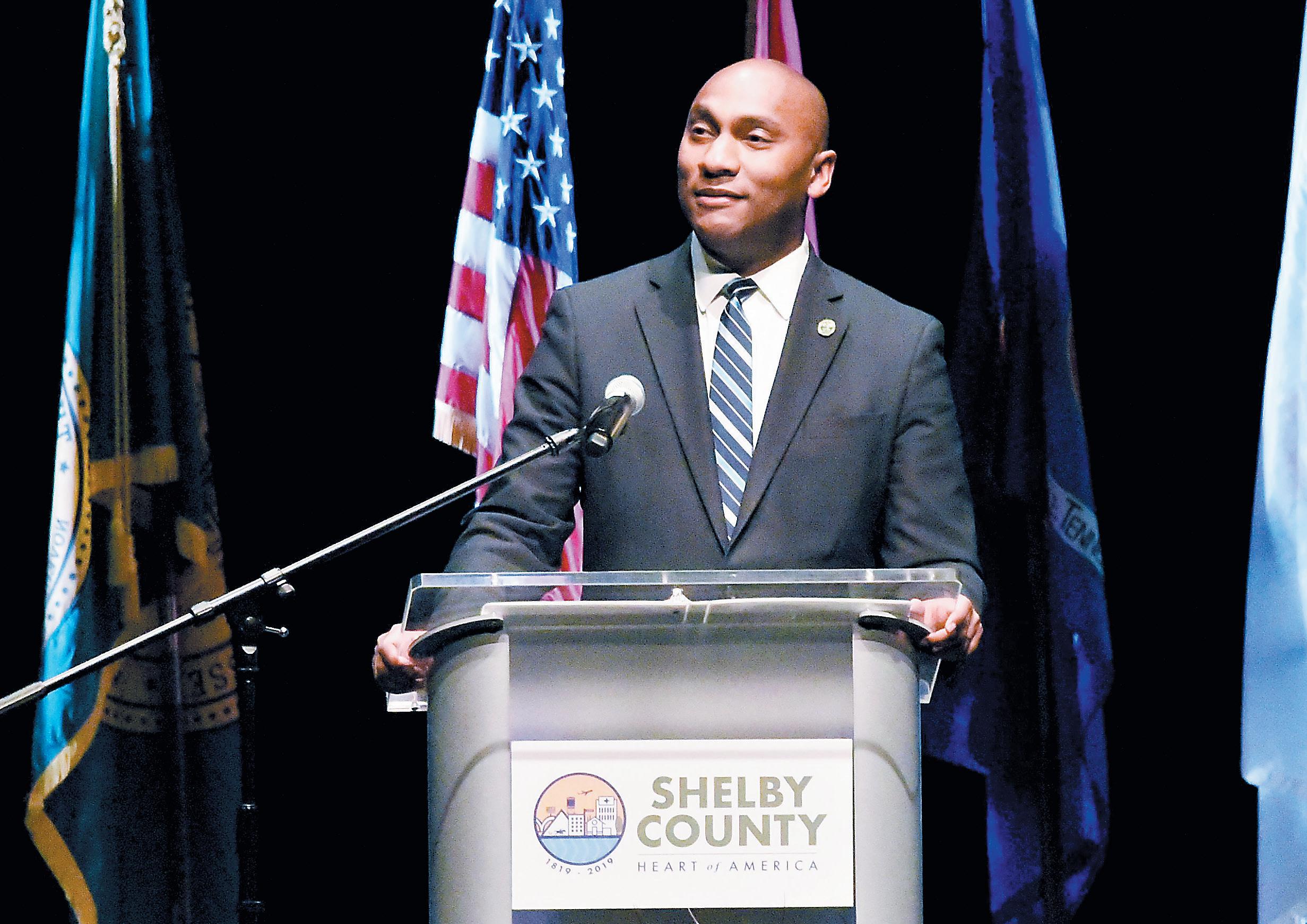
Shelby County Mayor Lee
conversations that matter to a broad
Erica R. Williams Special to The New Tri-State Defender
There is more to be done.
That is the theme Shelby County Mayor Lee Harris hammered home throughout his second State of the County address delivered Feb. 21 at Collierville High School. He echoed the same sentiments days later when we met for a one-on-one interview in his Downtown office.
Harris considers his office an “advocacy organization that sparks dialogue on issues that matter to the public.”
The mayor certainly has pushed
the envelope on conversations surrounding livable wages for county employees, criminal justice reform and a progressive plan for public transit. He is quick to point out many of the complex issues that still exist, including high rates in poverty and ex-felon recidivism, crumbling school buildings and an outdated public transit system.
Still, he said progress has been made.
Just a few days after his State of the County speech, Harris doubled down on his plans for Shelby County, including an additional proposal for funding public transit, another massive investment in education and the plans to lift thousands of
AFRICAN-AMERICAN HISTORY MONTH
Special to The New Tri-State Defender
Georgia Rodgers Woodruff was a gifted, 22-year-old pianist working under the tutelage of Miss Lucie E. Campbell at Central Baptist Church in South Memphis.
But it was her angelic soprano voice that landed her in King Vidor’s epic AfricanAmerican movie “Hallelujah” in 1929.
“We called her ‘Money,’ said Woodruff’s

granddaughter Erlene Carter. “She was always, and I mean always, dressed to the nines. Our grandmother looked like money, and she was beautiful. Even without make-up, she was stunning, but when you saw her anywhere, that face was camera-ready.”
Carter’s mother, Rubye Woodruff Carter, was Ms. Georgia’s only child. The story of her mother’s breakout movie role was has been part of the family lore as long as she can remember. Now, Ms. Rubye’s daughters, twins Erlene
and Verlene Carter, and older sister, Evelyn Carter, are keepers of the legacy.
“Of course, when I was growing up, I didn’t see my mother as this larger-than-life woman,” said Rubye Carter. “She was just ‘Mama’ to me. But her wonderful story was instilled in me, I guess, from the time I got here.
“This was before I was born, but she played under Miss Lucie Campbell who wrote so SEE

residents out of poverty.
Enterprises)
Harris, a Democrat, was sworn in as the sixth mayor of Shelby County on Sept. 1, 2018. He graduated from Overton High School and earned a law degree at Yale Law School. He was elected to the Memphis City Council in 2011 and to the Tennessee Senate in 2014.
Here are highlights from his interview with The New Tri-State Defender:
TSD: You just gave your second State of the County address. How do you feel
SEE HARRIS ON PAGE 9
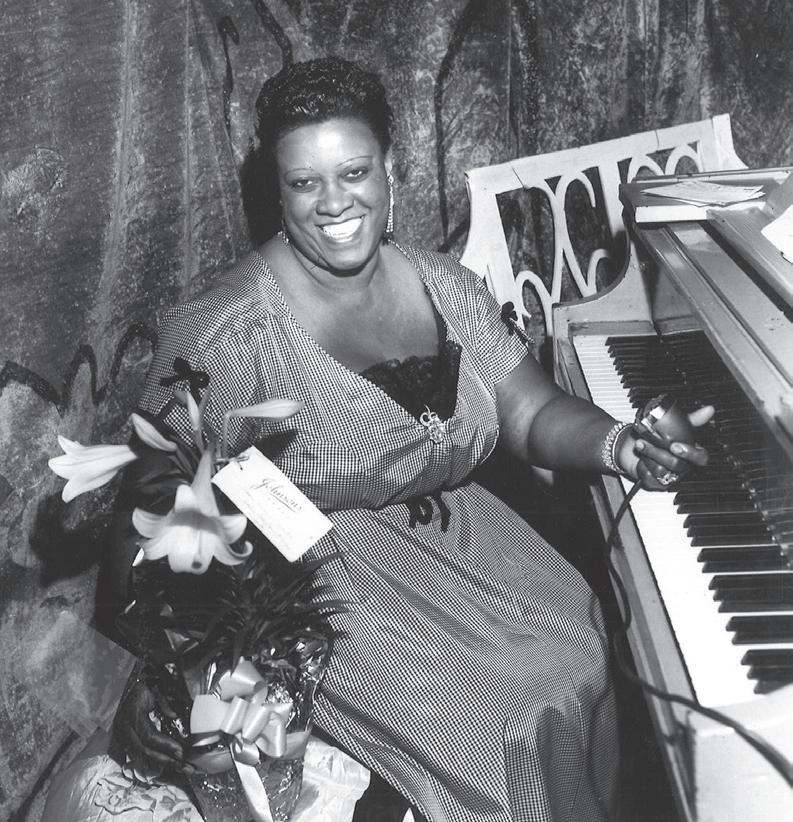

VOTE
CONTINUED FROM FRONT
of Bloomberg’s downtown Memphis headquarters.
“Right now we are at a very critical time in America where how we move forward as a country will be watched by the rest of the world, and the values and issues that we support.
Shelby County Mayor Lee Harris, along with State Sen.
many gospel songs right there at Central Baptist Church. One of Miss Campbell’s songs, “My Savior,” has my mother’s name on it.
“Miss Campbell would get to church and whisper to my mother, and she would play her songs on the piano. My mother was the first to play one of Ms. Campbell’s most popular compositions, ‘Touch Me, Lord Jesus.’”
The three granddaughters all know the story of how their grandmother was discovered in Memphis. King Wallis Vidor, an accomplished screenwriter and film director, set out in 1928 to make a blockbuster “race film” using an “all-black” cast.
He received a Best Director Academy Award (Oscar) nomination for “Hallelujah.”
It was the first time a “white film director” endeavored to work with an entirely AfricanAmerican cast.
He was nominated five times for a Best Director Oscar, and won eight international film awards. Vidor received an
Raumesh Akbari (District 29), has rallied support around former U.S. vice president Joe Biden. Sen. Akbari said she’s confident in the response Biden will see in Tennessee and other Southern states.
“The South has something to say on Super Tuesday and I think you’ll see the diverse coalition Joe Biden has built really will show up on that Election Day,” Akbari said.
Presidential candidate and Massachusetts Sen. Eliza-
honorary Oscar to cap the end of a stellar career.
“A movie like that in the early 1900s was quite a spectacle,” said Verlene Carter. “Daniel L. Haynes and Nina Mae McKinney were singing and acting sensations of their day who got the leading roles. Other talented actors and actresses played supporting roles – dancing, singing, and performing choreographed movement. For its time, “Hallelujah” as a dramatic, musical film production was quite an accomplishment.”
Rubye Carter can remember her mother talking about the whole experience of filming the movie.
“Of course, it was before I was even born, but I remember Mother talking about how it was just a group of young people having fun,” she said.
“Nina Mae McKinney was only 16 years old at the time. But they were all young, going to the set every day to sing and dance and congregate. It was great fun. That’s what mother talked about when she recalled the experience.”
Not only was Georgia Rodgers Woodruff musically gifted; she was a brown-
beth Warren gained support from Shelby County Commissioner Tami Sawyer early on during her campaign. Sawyer joined Warren at an event during her stop in Memphis last March.
“Elizabeth Warren came to Memphis and listened,” Sawyer wrote on her website. “She didn’t stump. She answered questions, shared her policy and got to the heart of what’s impacting us the most – from poverty to inadequate afford-
able housing options. ….”
Although the presidential primaries have been at the forefront of the upcoming election, residents won’t just be voting for the president on March 3. Also on the ballot are 15 candidates vying for Shelby County General Sessions Court Clerk.
Phillips issued a warning to voters, asking them to carefully review the ballot due to candidates dropping out of the race after the ballot was set.
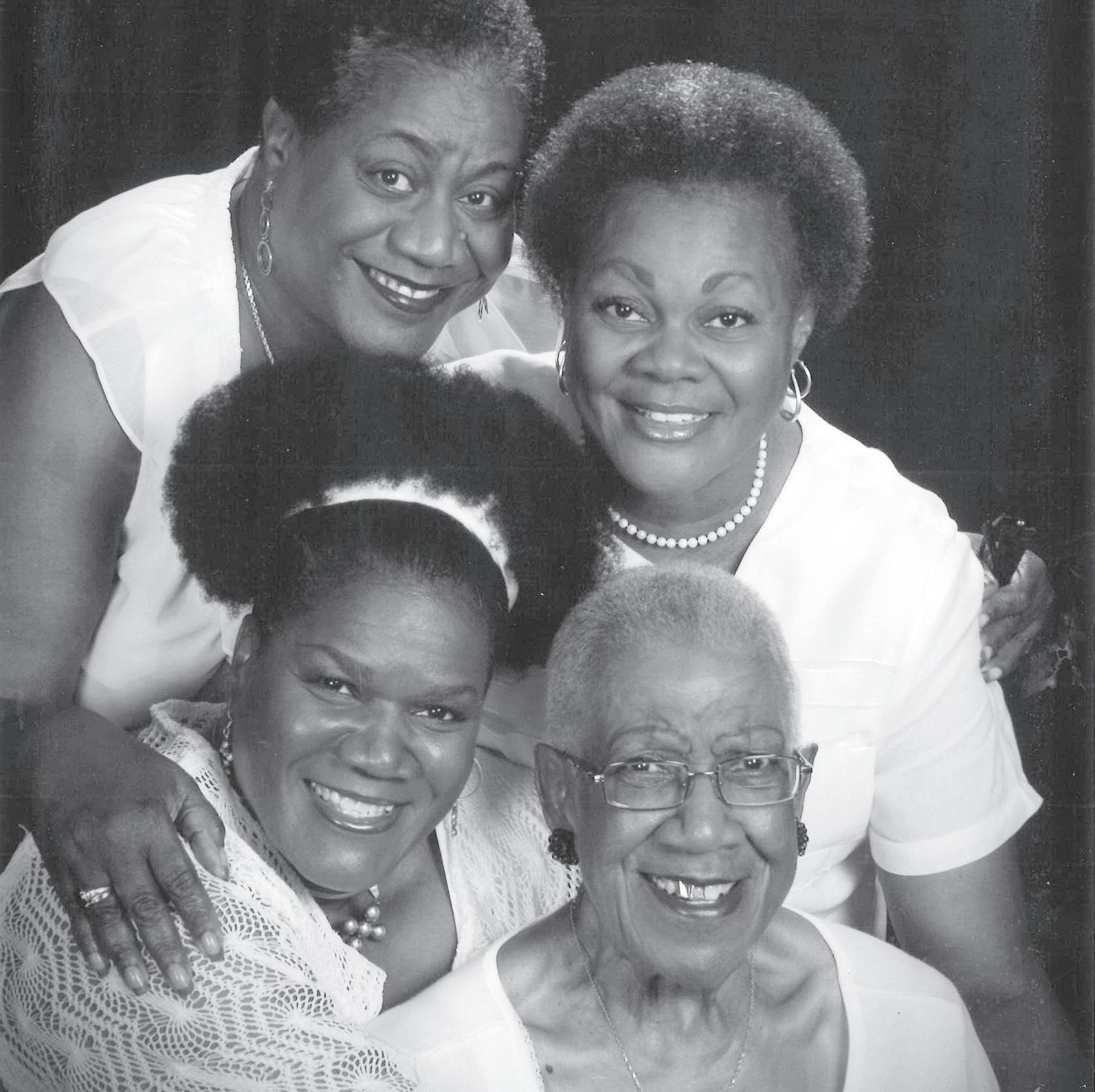
skinned beauty just waiting to be discovered by Hollywood. But the happenstance seemed quite accidental.
The major characters for leading roles had been cast, and some scenes had been shot up north. Vidor determined that various Southern venues would lend authenticity to the production.
Eva Jessye, a Harlem

Renaissance star gaining international fame as a choral conductor, was “Hallelujah’s” music director. She also was music director for Ira Gershwin’s production of “Porgy and Bess.”
The production was moving down South for a few weeks to film. The soprano chosen for the film refused to come South because of all the racial
“Some candidates who have dropped out of the race – their names are still on the Tennessee Ballot. Our ballot is set in December. Voters may see names of people who no longer have active campaigns,” Phillips said. “Please make sure you’re voting for someone who is still running.”
The Democratic clerk candidates on the ballot are Gortria Anderson Banks, Rheunte E. Benson, Joe Brown, Tanya L. Cooper, Adrienne Dailey-Ev-
violence and hatred she read about.
Jessye had quite a challenge.
Verlene, the other twin granddaughter, picks the story up from there.
“When Eva Jessye arrived in Memphis on the train, she asked some of the porters if they knew of a soprano who could be in the film,” Verlene said. “Someone told her to go to Central Baptist Church. She heard my grandmother, and asked her to come over to the hotel where the cast was staying.
“It was the old Traveler’s Inn. Vidor was staying at the Peabody, but the rest of the cast couldn’t stay at the Peabody at that time. Grandmother sang for them, and she was hired right on the spot.
“Scenes were shot on Porter Street near the present-day location of LeMoyne-Owen College. There was a bayou over there where the baptismal scene was shot. Many local extras in the community were used.
“There was singing, shouting, and choreographed movement as well as acting throughout the movie. For the plantation scenes, Wilson Brothers Plantation over in Arkansas was
ans, Wanda Logan-Faulkner, Deirdre V. Fisher, R. S. Ford Sr., Del Gill, Eddie Jones, Thomas Long, Reginald Milton and Tavia Tate.
The Republican candidates on the ballot for General Sessions Court Clerk are Paul C. Boyd, Michael Finney, George “Dempsy” Summers and Lisa W. Wimberly.
In addition to Tennessee, Arkansas will hold its presidential primary March 3.
the actual setting.”
After local filming, the cast went to Hollywood to wrap up final shooting. Woodruff spent several weeks there shooting her role.
“My grandfather, William O. Woodruff, told her to come home, and she did,” said Evelyn Carter. “My grandmother returned home and continued playing in her church as well as many other prominent events and venues.
“People always remembered her as the movie actress. She played the organ at Metropolitan Baptist Church, just sitting on the organ in all that ‘fabulousness’ wearing fancy hats.”
Georgia Rodgers Woodruff lived with her family at 535 Alston Ave., off of Mississippi Boulevard in South Memphis. She taught school in Arkansas. Later, she worked at Woodstock High School in Shelby County and retired while teaching at Graceland Elementary School in Whitehaven.
She was 75 when she died in Memphis in January 1981. Her daughter, Rubye Carter, also is a retired educator, living in South Memphis.
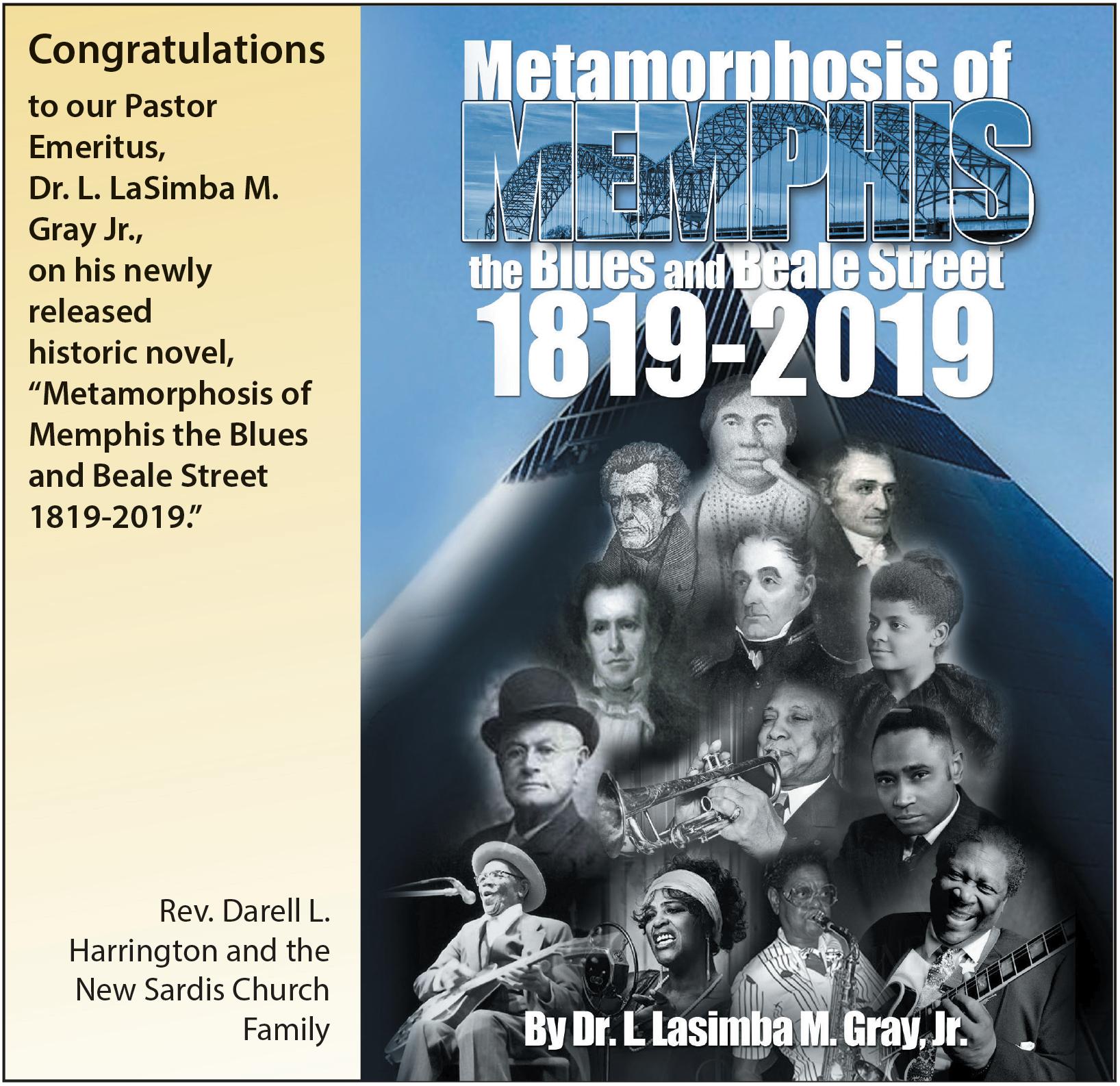



















































From the desk of
MIKE BLOOMBERGDear Reader,
Thank you for taking the time to learn about The Greenwood Initiative. As someone who has been very lucky in life, I often say my story would only have been possible in America — and that’s true. But I also know that because of the artificial barriers of discrimination, my story likely would have turned out very differently if I had been Black, and that more Black Americans of my generation would have ended up with far more wealth, had they been white.
Building Generational Wealth for Black Families is Critical. That’s why I launched The Greenwood Initiative in Tulsa last month. I visited the site of the Black Wall Street Massacre, where a white mob decimated the prosperous community of Greenwood. It is to the memory of the lost lives and promise of Greenwood that we’ve dedicated The Greenwood Initiative: a plan to address the systematic bias that has kept Black Americans from building wealth.
THE GREENWOOD PLAN WILL:
• Create 1 million new Black homeowners
• Double the number of new Black-owned businesses
• Invest $70 billion in the country’s 100 most disadvantaged neighborhoods
Fixing the System for Black Families. When I was mayor of New York, I was proud to take on the systematic inequality that held back too many New Yorkers. We increased education funding, built 650 new schools and raised Black graduation rates to record highs. We led an ambitious effort to reduce poverty and managed the largest amount of affordable housing in the nation. And as President, I will work even more aggressively to combat inequality nationwide.
I understand that undoing generations of systematic discrimination won’t happen overnight, but we can make progress with a clear vision and a comprehensive plan. I’ve included a pamphlet along with this letter that lays out my plan. When I’m President, implementing The Greenwood Initiative will be a top priority.
Join me in ending the systemic inequality that has held Black Americans back for too long!

Sincerely,
 Mike Bloomberg
Mike Bloomberg

Runaway elitism for the benefit of the small few is the governing doctrine in Memphis.
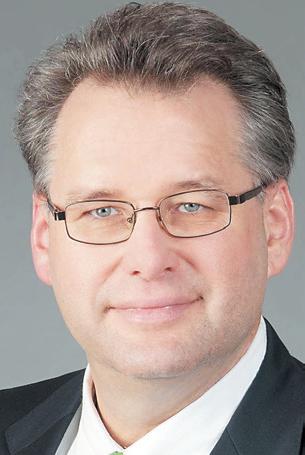 Joseph B. Kent
Joseph B. Kent
Empowered and overseen by local legislative bodies, elitism not racism, has governed the competitive decline of the Memphis ecosystem on the back of a majority-black community in need. Elitism is locally carried out, with diverse representation, across a vast public-private complex that is gobbling up federal, state and local tax dollars with too little accountability.
Meanwhile, since 2001 and with unaccountability running amuck in Shelby County, $50 billion in lost wages can be accounted for in defi cient total wage growth when Shelby County is compared to its municipal peers. That amounts up to $50,000 for every person in Shelby County and $1.5 billion in defi cient public investments.
The elitist formula that dismisses the local taxpaying population for the benefit of the small few is a prescription for the neighborhood decline found in areas such as the historic Orange Mound neighborhood. This occurs within a pageantry of local initiatives and social justice efforts that the data would suggest camouflages runaway elitism on the back of a Memphis community in need.
The value of moving Confederate-era symbols is enhanced when paired with substantive efforts to increase the quality of life for an impoverished city such as Memphis, where stagnation and the lack of local growth has occurred without much-needed taxpayer advocacy and the support of fundamental checks and balances.
Memphis lacks checks and balances that come in the form of rotating board appointments, rigorous legislative oversight, an investigative press and university thought leadership. As a matter of basic process, it’s virtually impossible to defend the recent reappointment of an abating-board chairman who will serve longer than our two mayors and our legislative bodies.
The lack of checks and balances results in a rigged condition that stagnates growth while the small few prosper. This lack of checks and balances contributes mightily to deficient education for our youth, neighborhood decline and nationally high poverty rates, all occurring within a pageantry of local social justice and community betterment initiatives.
Meanwhile, from my vantage point it appears that a rotating band of board appointees within the suspect private-public complex continues to mouth that “we know, we got a long way to go” when the truth is that we’ve started on the wrong foot in the wrong direction.
We need a data-driven course correction, including a public discussion of the perils of the private-public complex that is blocking a wider generation of wealth.
Based on readily-available data, conversations of elitism, within the context of basic taxpayer advocacy for all, in a majority-black community, should be prioritized in the local discourse.
After all, elitism is the parent of racism.
(Joseph B. Kent is lead consulting facilitator at Path Trek, LLC.)

It is a serious financial problem that far too many African Americans – from impoverished individuals to working-class families — face these days in the bewilderingly complicated health-care market: Getting hit with an unexpected bill after a hospital stay or visit to the emergency room.
Known as “surprise medical billing,” these unexpected costs arise when a patient goes to a hospital for emergency or non-emergency care, only to find out afterwards that one of the medical providers who administered care was not covered in the patient’s insurance network.
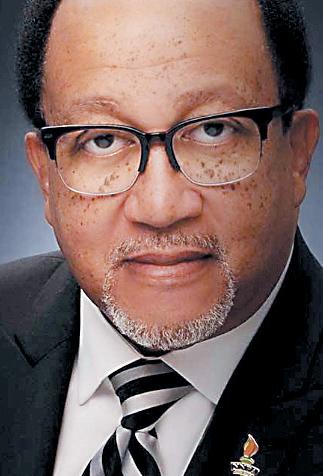
This outrageous situation benefits one group and one group alone: powerful insurance executives, who have managed to get off the financial hook for such bills, even as insurers shrink insurance coverage networks to wring more and more profits out of the system.
But this predatory practice is overwhelming to a family already dealing with the emotional and financial burdens of a medical crisis, typically adding thousands of dollars in unexpected expenses that can wipe out savings accounts or otherwise strain tight household budgets.
So, what can be done to stop and end surprise medical billing?
The good news is that both Republicans and Democrats in Congress agree that legislation is needed to protect patients against unexpected medical charges. But as with many complicated issues confronting Congress, lawmakers have been divided on the details of such legislation.
Part of the paralysis in Congress stems from confusion and disinformation, as insurance executives and their allies try to frame the debate to their advantage.
When Congress tried to address the issue last year, for example, the insurance lobbying machine swung into action, attempting to place the blame for surprise bills on out-of-network medical providers who end up having to charge patients when insurers refuse to cover a medical bill.
Big insurance almost got its way in that legislative debate when a handful of lawmakers threw support behind a legislative proposal that would shield insurance companies from paying what they ought to pay. The legislation, championed by Sen. Lamar Alexander (R-Tenn.), specifically called for setting benchmarked rates for out-of-network medical providers.
But far from solving the problem, this approach would make matters worse. It not only frees insurers from their responsibilities. It fails to compensate providers for the cost of the care that they actually provide. And that, in turn, means either patients will get stuck with the bill or medical providers will have to absorb big losses that ultimately jeopardize their ability to stay in business.
Fortunately, the proposed bill stalled after the medical community warned that the benchmarked rate favored by the insurance industry would allow insurers to exert a new troubling level of control over health-care prices and the larger health-care delivery system.
Now, as Congress begins to take up the issue once again, health insurance companies that evaded significant scrutiny last year seem to be drawing close scrutiny now, both inside and outside of Washington.
Speaking to a group of faith leaders and policymakers in South Carolina, an important stop for the 2020 Democratic presidential primary, Reverend Al Sharpton criticized the surprise medical billing legislation backed by insurers and stressed the urgent need to deal with the continued lack of access to adequate health insurance coverage for minority communities.
“Washington is getting it wrong,” he wrote in an opinion piece published after his South Carolina trip, adding that the bill introduced by “Sen. Lamar Alexander (R-Tenn.) to ‘solve’ the surprise billing problem would literally insulate insurance companies from covering these costs, at a time when profits for insurance companies have reached record highs.”
In the U.S. House of Representatives, Ways and Means Committee Chairman Richard Neal (D-Ma.) predicted that health insurers would do little more than look out for their own interest if they were given the authority to set rates for out-of-network providers.
“My concern with giving too much weight to such a benchmark

The good news is that both Republicans and Democrats in Congress agree that legislation is needed to protect patients against unexpected medical charges. But as with many complicated issues confronting Congress, lawmakers have been divided on the details of such legislation.
rate is that we already know insurers are looking for any way they can to pay the least amount possible,” he said. “They will work to push those rates down, regardless of what it means for community providers like physicians, hospitals, and our constituents who they employ.”
There were similar concerns in the U.S. Senate, where Senator Bill Cassidy (R-La.) warned that insurers began gaming the system in California once benchmarking rates became the law of the land in that state in 2016.
“Insurance companies cancel contracts and then they have the negotiating power and they establish” their own rate, he said, adding that such benchmarking of rates would likely put hospitals “out of business.”
It’s worth noting that lawmakers are raising such concerns despite the considerable backing the insurance-industry legislation has had from two powerful lawmakers: Senator Alexander, chairman of the Senate Committee on Health, Education, Labor, and Pensions; and Frank Pallone, the chairman of the House Energy and Commerce Committee, whose jurisdiction includes health care issues.
More than that, Senator Cassidy introduced legislation that would eliminate surprise medical billing by establishing an arbitration system between insurers and providers — rather than sticking the disputed medical charges to patients. And that legislation is gaining strong bipartisan support, as is a similar bill in the House that is being advanced Representative Phil Roe (R-TN) and Representative Raul Ruiz (D-CA), both of whom are doctors.
Surprise medical billing is a problem we can no longer ignore, particularly at a time when roughly two-thirds of Americans say that they are concerned about their ability to pay for an unexpected medical expense for themselves or for a family member. And this practice it is especially hard on African Americans and other people of color in the U.S. who already face significant barriers to health care and who generally receive lower quality of care than the rest of the nation.
Congress has an opportunity to make things right by ending the practice of surprise medical billing. Black Americans and all others in America shouldn’t be saddled with exorbitant bills that they had no reason to expect – and that impose an unjust financial burden.
(Dr. Benjamin F. Chavis, Jr. is President and CEO of the National Newspaper Publishers Association (NNPA) and can be reached at dr.bchavis@nnpa.org.)


WASHINGTON – White supremacist mass murderer Dylann Roof staged a hunger strike this month while on federal death row, alleging in letters to The Associated Press that he’s been “targeted by staff,” “verbally harassed and abused without cause” and “treated disproportionately harsh.”
The 25-year-old Roof, who killed nine black church members during a Bible study in Charleston, South Carolina, in 2015, told the AP in a letter dated Feb. 13 that the staff at the federal prison in Terre Haute, Indiana, feel justified in their conduct “since I am hated by the general public.”
A person familiar with the matter said Roof had been on a hunger strike but was no longer on one, as of this week. The person couldn’t immediately provide specific details about the length of the hunger strike or whether medical staff needed to intervene. The person wasn’t
authorized to discuss the matter publicly and spoke to the AP on condition of anonymity.
Roof wrote in his letter to the AP that he went on the hunger strike to protest the treatment he received from a Bureau of Prisons disciplinary hearing officer over earlier complaints that he was refused access to the law library and access to a copy machine to file legal papers.
Roof’s Feb. 13 letter indicated he was already “several days” into a hunger strike, and he wrote in a follow-up letter that the protest ended a day later after corrections officers forcibly tried to take his blood and insert an IV into his arm, causing him to briefly pass out.
“I feel confident I could have gone much, much longer without food,” Roof wrote in the Feb. 16 follow-up letter. “It’s just not worth being murdered over.”
The allegations could not immediately be verified and a spokeswoman for the Bureau of Prisons said the agency had no comment on Roof’s allegations, citing privacy concerns.
Roof’s lawyers said in a statement that they were “working with BOP to resolve the issues
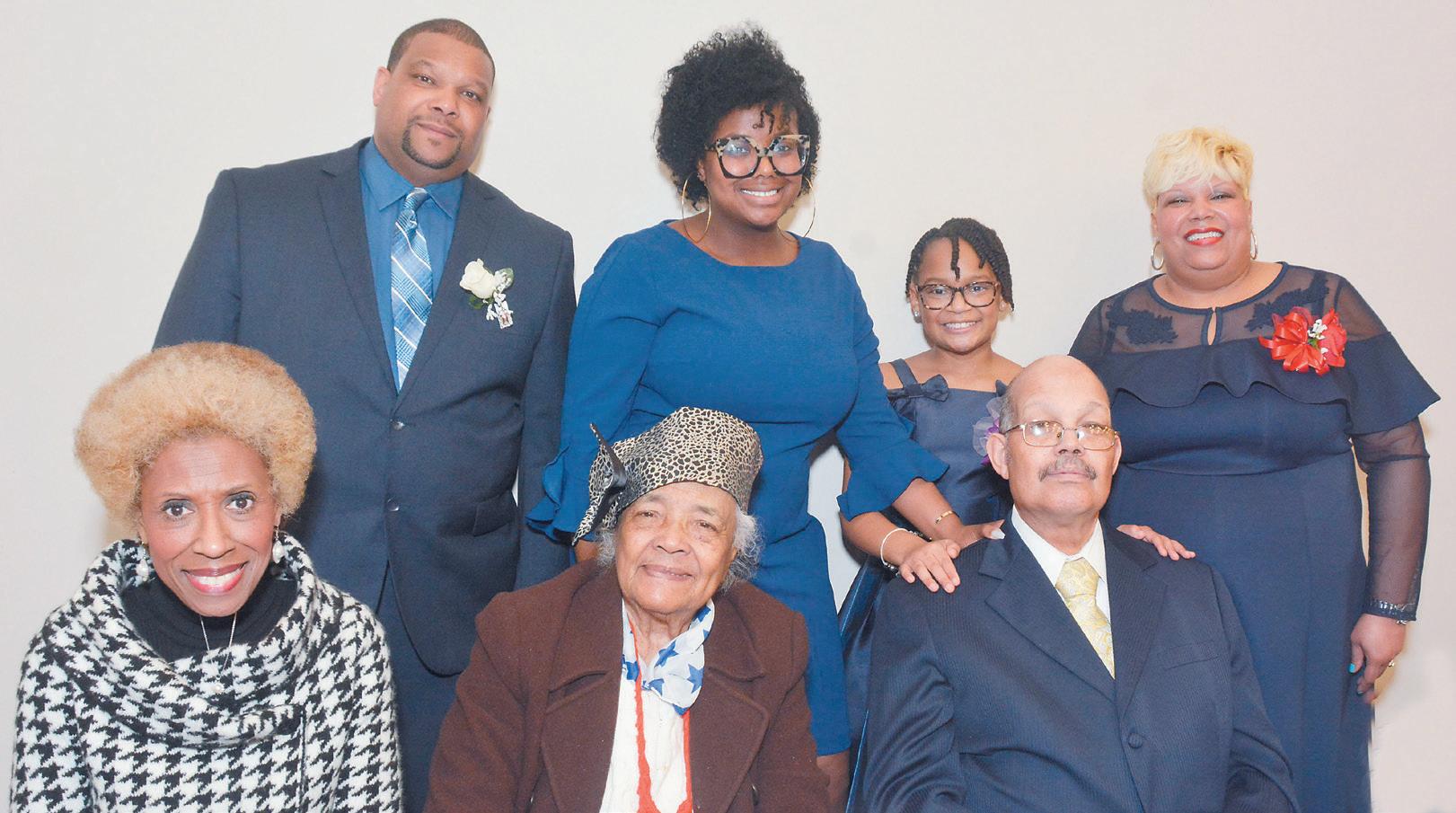
Homegoing services were held Feb. 22 at Castalia Baptist Church for Mrs. Deloris Vivian Adair Walker
the wife of the Rev. Dr. Randolph Meade Walker, Castalia’s pastor
bottom
is
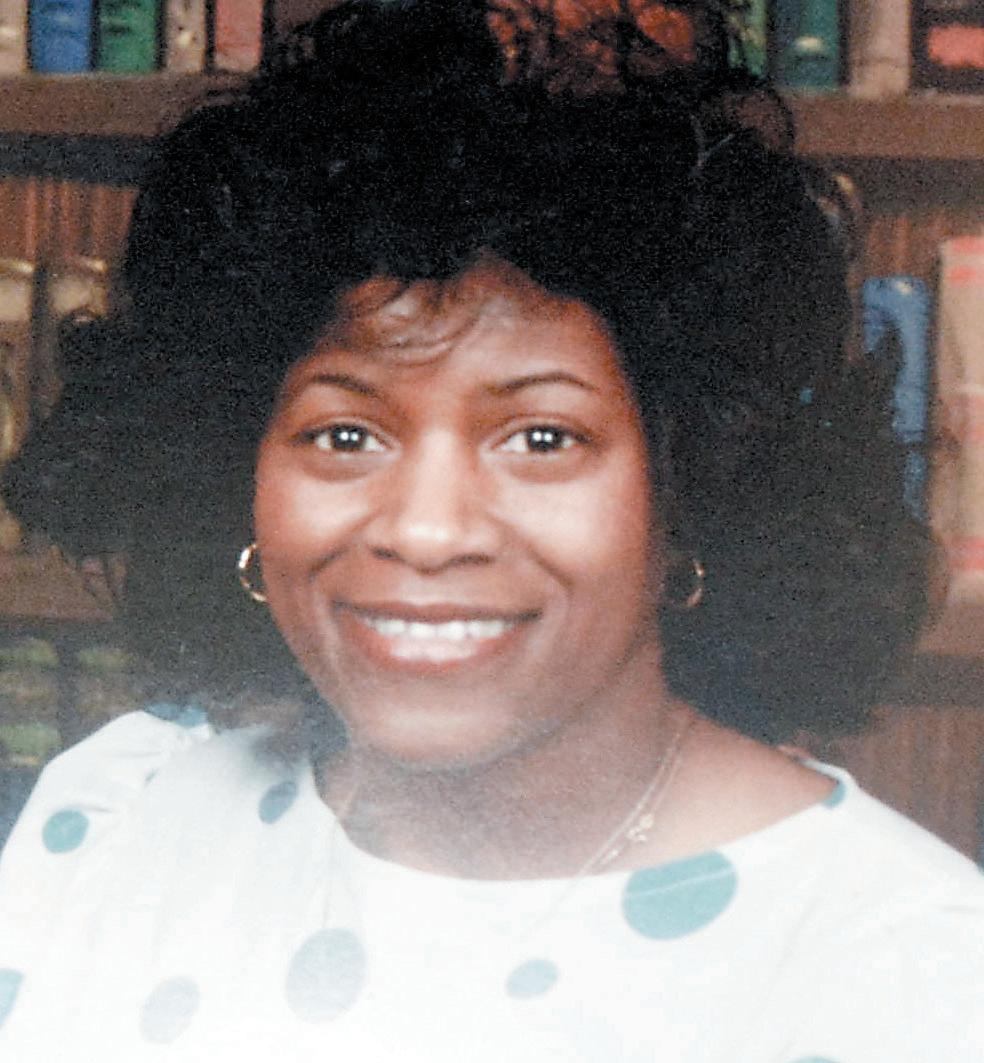
addressed in the letters.”
Roof’s lawyers filed an appeal to his federal convictions and death sentence last month, arguing that he was mentally ill when he represented himself at his capital trial.
In a 321-page legal brief, Roof’s lawyers asked a federal appeals court in Richmond, Virginia, to review 20 issues, including errors they say were made by the judge and prosecutors that “tainted” his sentencing. One of their main arguments is that U.S. District Judge Richard Gergel should not have allowed Roof to represent himself during the penalty phase of his trial because he was a 22-year-old ninth-grade dropout “who believed his sentence didn’t matter because white nationalists would free him from prison after an impending race war.”
Roof is the first person to be ordered executed for a federal hate crime. Attorney General William Barr announced in July that the government would resume executions and scheduled five executions — though Roof is not included among that group — ending an informal moratorium on federal capital punishment as

the Charleston County Judicial Center in Charleston, S.C., to enter his guilty plea on murder charges (April 10, 2017). The white supremacist church shooter staged a hunger strike in February 2020 while on federal death row, alleging in letters to The Associated Press that he’s been “targeted by staff,” “verbally harassed and abused without cause” and “treated disproportionately harsh.” (Grace Beahm/The Post And Courier via AP, Pool, File)
the issue receded from the public domain. The Supreme Court has temporarily halted the executions after some of the chosen inmates challenged the new execution procedures in court.
(Martinez reported from New York; AP writer Jeffrey Collins in Columbia, South Carolina contributed to this report.)
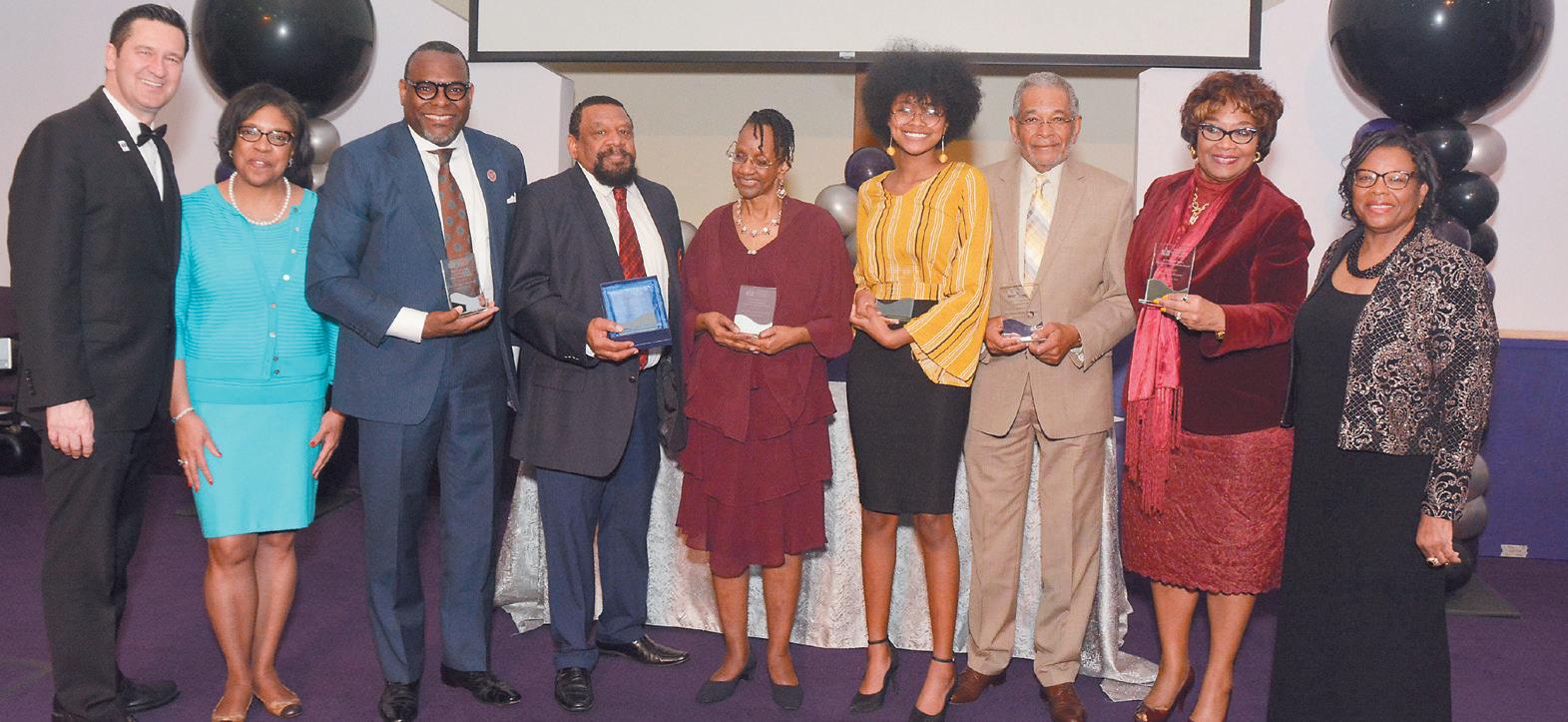
Presented by Memphis Theological Seminary (MTS), the 33rd Rev. Dr. Henry Logan Starks Scholarship/Endowment Dinner was held at First Baptist ChurchBroad on Feb. 20. The honorees were: the Rev. Edward Lee Thompson, Beverly Robertson, Janay Kelley, the Pioneer Black Firefighters, The Rev. Dr. Deborah Carter and the Rev. Dr. Christopher B. Davis Sr. Also pictured: MTS President Jody Hill, Dianne Love (program director) and Debra M. Reid (steering committee chair). Dr. Starks was a MTS racial barrier breaker as a student and professor. (Photo:
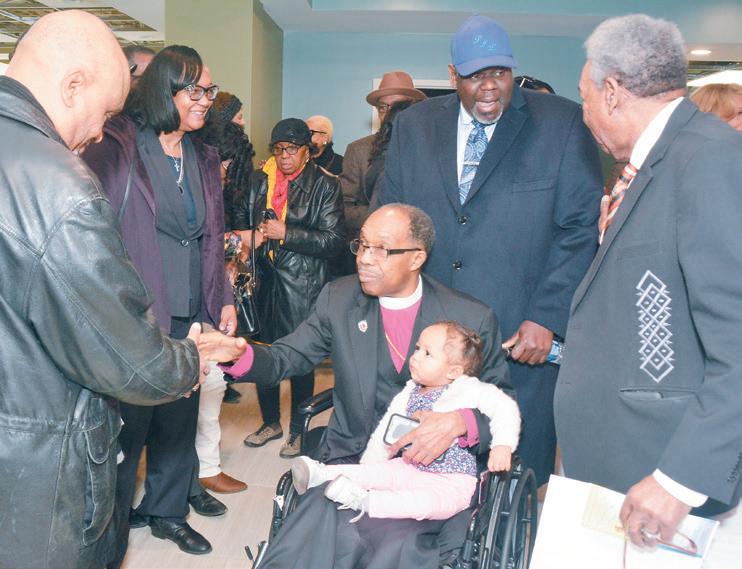
Collins Chapel Connectional Hospital, located at 409 Ayers St., showcased “Reunion Day” in observance of Black History Month last Saturday, Feb. 22. With the future in mind, CME Bishop Henry Williamson (seated), Collins Chapel Connectional Hospital rebirth chairman, greets a supporter of the $5 million effort to renovate the only hospital where African Americans were born and treated during the height of segregation. (Photo: Tyrone P. Easley)
 (bottom right),
(top photo,
right), who
pictured here with family members, including the Walkers’ children – the Rev. Jennifer Michelle Young (top right) and John Randolph Walker (top left). Mrs. Walker, whose professional career included many years working as a child care director and serving senior citizens, passed away Feb. 15. She was 70.
(Photos: Tyrone P. Easley)
Tyrone P. Easley)
Dylann Roof arrives to a courtroom at
(bottom right),
(top photo,
right), who
pictured here with family members, including the Walkers’ children – the Rev. Jennifer Michelle Young (top right) and John Randolph Walker (top left). Mrs. Walker, whose professional career included many years working as a child care director and serving senior citizens, passed away Feb. 15. She was 70.
(Photos: Tyrone P. Easley)
Tyrone P. Easley)
Dylann Roof arrives to a courtroom at

The New Tri-State Defender, February 27 - March 4, 2020, Page 6
Special to The New Tri-State Defender
Monday kicked off the first-ever “Mid-South Black Film Festival” in Memphis, and its founder is focused on “closing the gap between dreams and reality.”
“We want to make this film festival a landmark event in Memphis — an annual celebration of black excellence in film-making,” said William Edwards, who also founded the Global Black Film Consortium, which the film festival grew out of.
“We want to see black filmmakers all across the world being recognized for their work and admired by movie lovers everywhere,” he said.
Screening of original films, panel discussions and networking opportunities with industry professionals began
Tuesday, Feb. 25 and will conclude on Sunday, March 1. The first four days of the festival feature screenings of four historic documentaries by local filmmaker, George Tillman Jr..
Tuesday was Tillman’s “The Lucky Eleven,” followed by “True Blue” (Wednesday) and “The Birth of Soul Music” (Thursday). Tillman’s “What If There Be Thorns” will screen on Friday. Tillman’s work can be seen at the Malco Majestic Cinema, 7051 Malco Crossing from 7-9 p.m.
Other local films set to screen on Friday at The Venue@Lamar:
• “Big Tyme” (5 p.m.)
• “Dream,” (7 p.m.),
• “Boy With the Pop Bottle” (7:30 p.m.) A global film block on Saturday – also at The Venue@Lamar – will feature the work of filmmakers from Ghana, Haiti and Kenya. Global screenings begin at noon (see box for details).
The festival culminates at 4 p.m. Sunday with a red-carpet awards program at Melrose High School in Orange Mound. Opening awards commentary will be delivered by Dr. C. Sade Turnipseed, host of “Delta Renaissance” and official U.S. representative to the Pan-African Film Festival.
Special guest and theatre director Erma Elzy said the event is significant for budding filmmakers.
“As a filmmaker myself, it is important to have an outlet where we can showcase stories and talent from the African diaspora in all genres that express our diverse points of view,” she said. “Thanks to the festival founders, staff, and sponsors who have brought this great festival to our city.”
Entertainment attorney Angela Green is also set to share her insights on the business side of filmmaking. Green is executive director of On Location, a nonprofit that has staged the International Film and Music Festival for 17 years.
Event Coordinator Jackie Murray called the festival important because filmmakers are getting the opportunity to have their work screened all over the world.
Seagram’s Escapes kicked off its seven-city Keep it Colorful Women’s empowerment tour with a collective of local women leaders at the University of Memphis Holiday-Inn on Tuesday (Feb. 25.
The event was hosted by “The Real Housewives of Atlanta” star Cynthia Bailey.
The Seagram’s Escapes brand is female-focused, celebrating women and championing female empowerment. As proof of its commitment to this important initiative, Seagram’s partnered with Bailey to spread the message of empowerment across several U.S. cities.
“I’ve learned a lot in my life and career that I’m excited to share with women across the country,” Bailey said. “This tour is creating space for women to feel empowered and strong.
“We have an incredibly inspiring
group of ladies sharing effective tools to confidence and success. I’m thrilled to bring this passion and momentum to Memphis. … Bailey shared intimate details about her career and steps that led her to landing a partnership with her first national brand with Seagram’s Escapes. The two-hour event included inspiring conversations from featured panelists: New Memphis Institute President and CEO Anna Mullins Ellis, NEXT Memphis Director Chloe Hakim-Moore, Beautiful Spirited Women founder Crystal Clark-Chatman and Dream Team Solutions, LLC CEO Crystell Oliver. They provided a unique insight with tips and tricks on empowerment and self-care, and shared their opinions on what it means to be strong women in their respected fields.
“It’s very important that we empower each other,” said

“If my being a small part of the bigger picture, of the global picture, helps to bring others into the forefront, then I’m very proud to be a part of it,” she said. Co-founder Jasmine Garner said the festival gives her a part in making history.
“To me, it is the generational legacy of the black community,” she said. “We have the talent, the ideas and the creativity to produce our own opportunities. My family has a legacy of talent…and this is a way of creating a path for people like my family to share their gifts and tell their stories.”
For more info and tickets, visit: www.midsouthblackfilm. com Listing of Saturday’s Global Films:
12 p.m. – “Good, Bad & The Apprentice”
12:30 p.m. – “Calloused Hands”
12:45 p.m. – “Why Me?”
1:50 p.m. – “Heirs”
2:15 p.m. – “Favour”
3:10 p.m. – “Chuma”
3:30 p.m. – “My Beautiful Beloved Mother”

Clark-Chatman. “Lot of times women get caught up by being jealous or envious of one another instead of pushing women to success, so tonight we’re all about setting the tone and raising the bar on women’s empowerment,” she said.
The women also shared personal stories about the challenges they faced within their lives, while giving motivational advice on how they conquered these challenges.
Mental health was a huge topic of conversation. “I’m such a huge advocate for mental health,” said Hakim-Moore. “Keeping your mind together while facing challenging adversaries is imperative to success. We wear a lot of hats. We’re mothers, businesswomen,
and wives, so keeping yourself and mind together should always be first,” she said.
Guests also had the opportunity ask questions to the panel, while indulging in Cynthia Bailey’s signature Peach Bellini Seagram’s Escapes flavor. They also enjoyed a meet-and-greet opportunity with the star.
“Cynthia Bailey is one of my favorite housewives from the show,” said attendee Yvette White. “Just seeing her in-person with these amazing women, I feel overwhelmingly inspired.”
(To learn more about the Seagram’s “Keep it Colorful” empowerment tour, please visit www.deagramsdescapes.com.)
Growing up I never thought I wanted children. Now that my husband and I have been blessed with a beautiful daughter, I reflect and wonder why I wanted to deny myself the beautiful experience of motherhood.
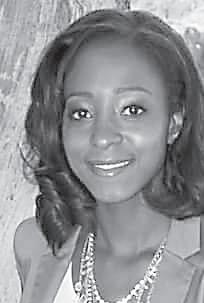
Zaniah (Niah), my daughter, recently turned a year old. She is as ACTIVE as she can be discovering the world around her. While she has gained the sense of exploring, the question of discipling comes to mind as she gets older.
I battle with what is the best approach to discipline a child. Historically, parents took the approach of “spare the rod, spoil the child,” but in today’s world, people look at discipline in an entirely different light.
As a new mother, I know there is no blueprint to this thing called motherhood. Spanking a child is often frowned upon, but let’s be honest: There is only so long you can say “no” and “stop” before thinking there has got to be another way.
I say “No, Niah” so much that my mother often jokes Niah will start thinking “No Niah” is her name! Mind you, I am not promoting beating a child when I say spank. I am simply referring to a tap on the hand or leg that may startle the child.
A Google search of “motherhood and discipling children” yields data with top results centered on Bible verses. While I am all for instilling verses, I do not believe simply reciting different Bible verses will make a child stop doing something.
Should you spank a child? If you do, is there an etiquette to it, meaning only doing it behind closed doors versus in public? At what age should you start to spank a child for them to grasp the purpose? If you start at an older age, say three or four, when a child has enhanced communication and comprehensive skills, is the discipling any easier in comparison to when they are one or two?
I can attest, for example, that Niah understands when I say “no,” “yes,” “stop,” “good job.” Sometimes she immediately stops and finds something else to do. There are times, however, when she would temporarily stop and then start again. This is when the discipline comes into play.
I truly believe the things a child is taught at an early age can set the tone for the rest of their lives and that includes teaching them the importance of respecting authority.
I recently observed Niah having a very dramatic temper tantrum when I said “No Niah.” She carefully and deliberately fell out in the floor and looked at me crying. I tried not to entertain her when she did it because I felt it would encourage the behavior.
I have to admit, I was stunned and wondered where she learned such behavior. When she realized I was not reacting to her, she simply got off the floor and started laughing.
An article published in “Parents Magazine” encourages doing something to distract the child and resist the urge to raise your voice. I have tried the distraction tactic, but Niah catches on easily.
I would take something from her and replace it with another item. She knows what she wants and will go looking for the original item. When she cannot find it, she will go into tantrum mode.
Discipling children, especially a toddler, is hard and everyone has their method of figuring out what works and what doesn’t. How do you handle discipline and what methods have brought you success?
(Brittany Jackson was part of the first corps of iTeen reporters for The New TriState Defender. Now as Brittany Holst, her iMom column is a periodic look at motherhood through millennial eyes.)
Host Cynthia Bailey (left) lines up with empowerment tour panelists (l-r) Anna Mullins Ellis, Crystell Oliver, Chloe HakimMoore and Crystal Clark-Chatman. (Photo: Tyrone P. Easley) Brittany Holst From left-right are: William Edwards, Mid-South Black Film Festival founder; Jasmine Garner, co-founder; featured filmmaker George Tillman Jr. and Jackie Murray, event coordinator. (Courtesy photo)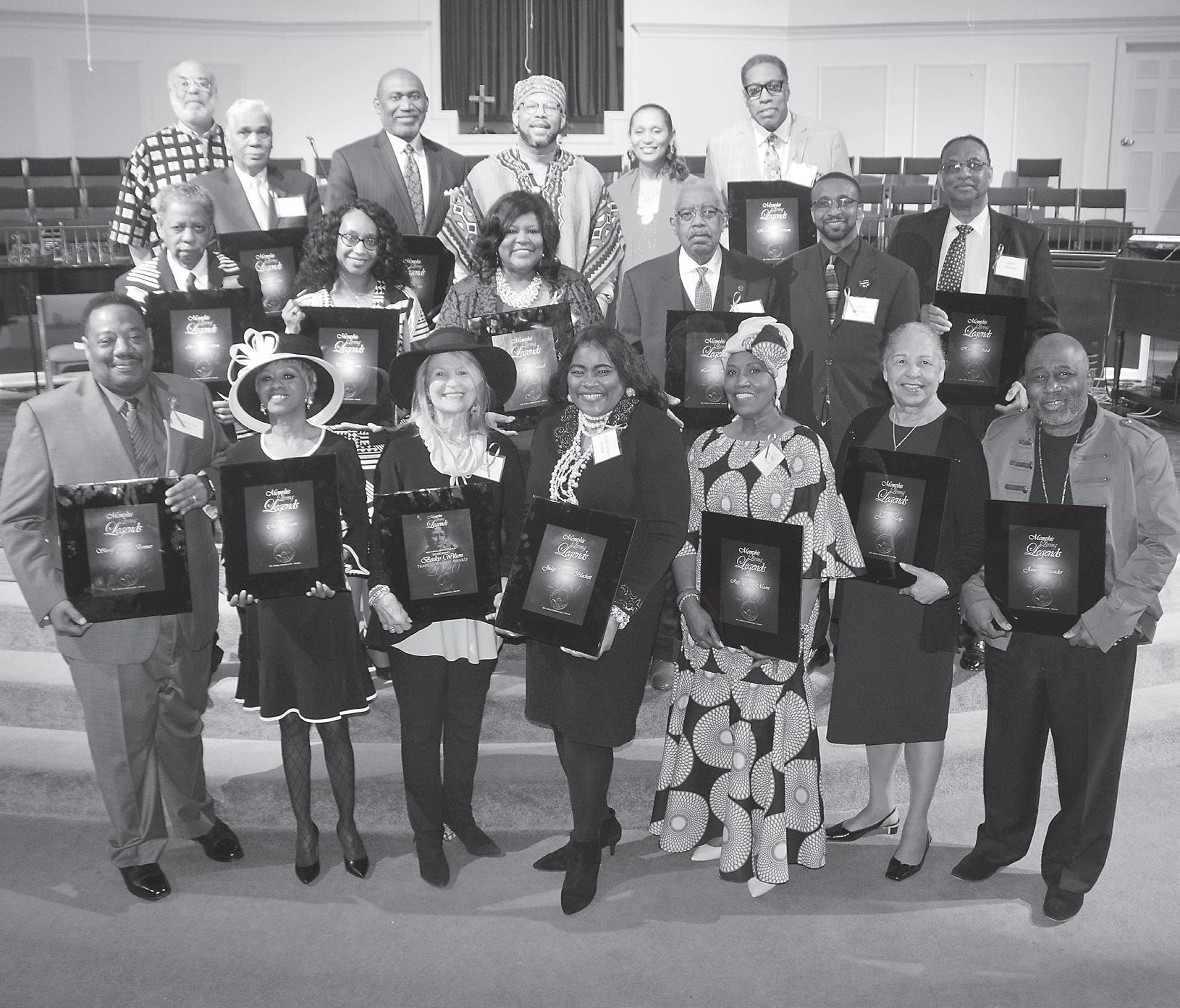
New Sardis Baptist Church, pastored by the Rev. Darell L. Harrington, last Sunday presented its annual Living Legends awards to James Alexander, Phyllis Aluko, esq., Judge Carolyn Blackett, Sheriff Floyd Bonner Jr., Yolanda Dillard, Gregory Duckett, Meka Egwuekwe, the Rev. Dr. William Saxe Epps, Herbert H. Hilliard, Dr. Leon Howard, Charles T. Miller Sr., the Rev. Mary E. Moore, James Lee Neely, Alonzo
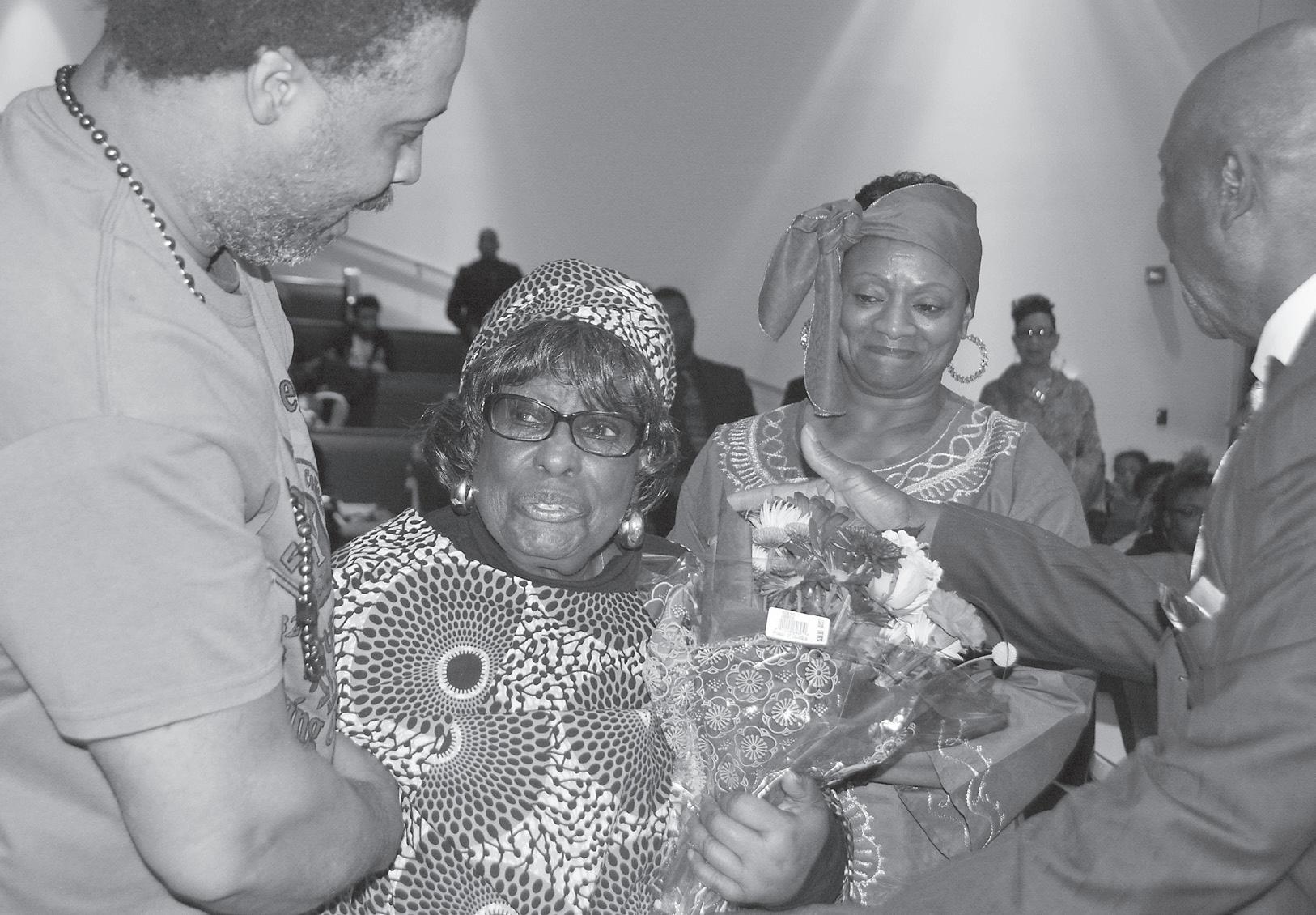

BOOK TALK: OVERGROUND RAILROAD WITH CANDACY TAYLOR
DATE: 2/27/20 STARTS: 6:00:PM
WHERE: 450 Mulberry Street, Memphis, TN 38103
DESCRIPTION:
It took courage to be listed in the Green Book, and Overground Railroad celebrates the stories of those who put their names in the book and stood up against segregation. It shows the history of the Green Book, how we arrived at our present historical moment, and how far we still have to go when it comes to race relations in America. Author, Candacy Taylor is an award-winning author, cultural critic and photographer with a Master’s Degree in Visual Criticism. The road is her home away from home and getting insider information about local haunts and hidden gems that never make it into travel guides is what she lives for.
BLACK HISTORY JEOPARDY
DATE: 2/27/20
STARTS: 4:00:PM
WHERE: 3752 Given Ave, Memphis, TN 38122
DESCRIPTION:
Kids will have a chance to be on teams and answer questions pertaining to black history month.
DATE: 2/27/20
STARTS: 5:00:PM
CANDLE MAKING
WHERE: 5094 Poplar Ave, Memphis, TN 38117
DESCRIPTION: Come learn to make candles with the adult librarians at PopWhite! Materials are all provided and it’s completely free, although you are welcome to bring your own jar or mug to make a candle in if you would like. Walk-ins for this program are welcome but Registration guarantees we will have enough supplies for you. Due to the use of hot wax in this program, patrons must be 18 or older to participate in this program. For more information follow the Events link at www.memphislibrary.org.
OPENING RECEPTION –NEW WORKS BY BILL HUETTEL
DATE: 2/28/20 STARTS: 5:00:PM
WHERE: 60 Perkins Extended, Memphis, TN 38117
DESCRIPTION: February 28 to April 6
Opening Reception Friday, February 28, 5 - 7 p.m. TROUT FISHING IN AMERICA
DATE: 2/28/20 STARTS: 8:00:PM
WHERE: 60 Perkins Extended, Memphis, TN 38117
DESCRIPTION: Since the beginning, Keith and Ezra have played shows for audiences of all ages in all sorts of venues. Trout’s broad appeal comes from their ability to connect with whoever is in the audience and their ability to create a full, rich sound that belies the fact that only two instruments are being played. $20 for adults and $15 for students
COMMUNITY DEVELOPMENT BOOK CLUB: BEALE STREET DYNASTY (PART I)
DATE: 2/28/20 STARTS: 5:30:PM
WHERE: 2034 James Road Memphis, TN 38127
DESCRIPTION: Community members gather to not only read books but to also share how Memphis can benefit from the lessons granted from each reading. Join us for the next Community Development Book Club, where we’ll discuss Preston Lauterbach’s vivid exploration of late-19th and early-20th century Memphis, Beale Street Dynasty. I AM MEMPHIS
DATE: 2/28/20 STARTS: 5:00:PM
WHERE: 3795 Frayser-Raleigh Road Memphis, TN, 38128
DESCRIPTION: The scholars of Breath of Life Preparatory Academy will premier the Black History film, I AM MEmphis! This film will show the exciting events of Afro-Americans in Memphis Tennessee! We will also display the spectacular Black History artwork
of our scholars. Be there at 5:00 to walk the red carpet. $2 per person
MAKE YOUR OWN: LEAP DAY ORIGAMI FROG
DATE: 2/29/20
STARTS: 12:00:AM
WHERE: 374 Metal Museum Drive, Memphis, TN 38106
DESCRIPTION: Create fold formed copper frogs that actually leap! This class teaches the process of fold forming using origami patterns. Origami paper will be provided to practice on, and thin copper sheet will be used to create the final project.
$15 | Age 15 and up*
*Ages 10 – 15 may attend but must have an adult registered with them.
LEHMAN-ROBERTS/MEMPHIS STONE & GRAVEL HIRING EVENTS
DATE: 3/5/20
STARTS: 10:00:AM
WHERE: 3040 Walnut Grove Rd., Memphis, TN 38111
DESCRIPTION:
Attention: H.S. Graduates, Retirees, Persons in Career Transition, Veterans and Transitional Service Members. Lehman-Roberts is seeking candidates to join our team in various roles, including heavy construction equipment operators, traffic control technicians, both skilled and entry-level labor positions. CDL holders are encouraged to apply as well. FREE JAZZ FRIDAY – THIRD MAN
DATE: 3/6/20
STARTS: 6:30:PM
WHERE: 3030 Poplar Avenue, Memphis, TN 38111
DESCRIPTION:
The trio of Tony Thomas on Hammond organ, Tom Lonardo on Drums, and tenor saxophonist Jim Spake, calls itself “Third Man.” The repertoire is an eclectic mix of bop and other instrumental cuisines that promote, again, extemporaneous performance. It is this group that you’ll be hearing in tonight’s performance.
ARBOR DAY CELEBRATION AND TREE GIVEAWAY
DATE: 3/6/20
STARTS: 12:00:PM
WHERE: 1914 Poplar Avenue, Memphis, TN 38104
DESCRIPTION:
Join the City of Memphis, Overton Park Conservancy, Memphis City Beautiful, and the Memphis Tree Board for a celebration of Arbor Day at Overton Park’s East Parkway Pavilion. Memphis will be presented with a Tree City USA award, and the Conservancy’s urban forestry fellows will present early findings from their research in the Old Forest. Memphis City Beautiful will be giving away 300 tree saplings to the public for planting, including eastern redbud, flowering dogwood, and buttonbush. After the ceremony, stick around and help us plant some trees around East Parkway Pavilion.
DATE: 3/7/20
STARTS: 10:00:AM
WHERE: 4080 Kirby Pkwy, Memphis, TN 38115
DESCRIPTION:
The Shelby County Democratic Party will host its Democratic County Presidential Convention at Kirby High School on Saturday, March 7, 2020. The purpose is to select representation from the county to attend the District Convention two weeks later, on March 21. The doors open for registration at 10:00 AM and the convention will begin at Noon. The event is open to all currently registered voters in Shelby County who are supporters of the Democratic Party, have voted in the March 2020 Presidential Primary, and who agree to support the nominee of the Democratic Party in the 2020 Presidential election. The convention will conduct caucuses for each of the top vote-getting presidential candidates in Congressional Districts 8 and 9. The party welcomes all Shelby County Democrats who wish to participate in selecting Tennessee’s delegates to the Democratic Presidential Convention in Milwaukee the week of July 13, 2020. More information on the event will be located on the SCDP website ShelbyDem.org.

The New Tri-State Defender, February 27 - March 4, 2020, Page 8
TSD Newsroom
New data shows that breast cancer support groups play a major role in helping underserved African-American women at risk for or diagnosed with breast cancer in Memphis.
The data is from a paper published this month in the International Journal of Environmental Research and Public Health. The principal investigator is Dr. Shelley White-Means, a professor of health economics at the University of Tennessee Health Science Center.
Using data from in-depth focus groups, White-Means, a faculty member in UTHSC’s Department of Interpersonal Education and the Institute for Health Outcomes and Policy, and her co-authors determined that these community-based groups are essential in overcoming barriers to care that include fear, lack of transportation and or child care, cost of medication, inadequate insurance, and other issues. Co-authors on the paper are Jill
Dapremont, EdD, RN, CNE, associate professor and director of the RN-BSN Program at the University of Memphis, Barbara D. Davis, PhD, associate professor in the Department of Management at the University of Memphis, and Tronlyn Thompson, a biology student at Howard University. The research was funded by the Tennessee Department of Health.
“There are community-based support agencies that are vital for the survival of African American women in Memphis with breast cancer,” White-Means said. These groups help women overcome economic, social, and psychological barriers to diagnosis and treatment and act as connectors in underserved areas for women with breast cancer.
The organizations include the National Breast and Cervical Cancer Early Detection Program funded by the Centers for Disease Control and Prevention, as well as navigator programs, and support groups that provide education, social, and psychological support to African-American women.
“The work that needs to be done is to have a greater interaction between providers and the health care system and the community-based support groups,” White-Means said.
“Gaps in death rates from breast cancer exist between black and white women in Memphis,” White-Means said. The national goal is to reduce breast cancer deaths to 20.7 per 100,000 females.
“In Memphis, while white women are close to meeting the 2020 goal, black women are not.”
White-Means has championed research into issues related to health disparities and health equity for decades. She joined the faculty of UTHSC in 2004.
From 2009-12, White-Means, her students, colleagues at UTHSC and LeMoyne-Owen College, and various community organizations, with the help of funding from the National Institute on Minority Health and Health Disparities, developed and ran the Consortium for Health Education, Economic Empowerment and
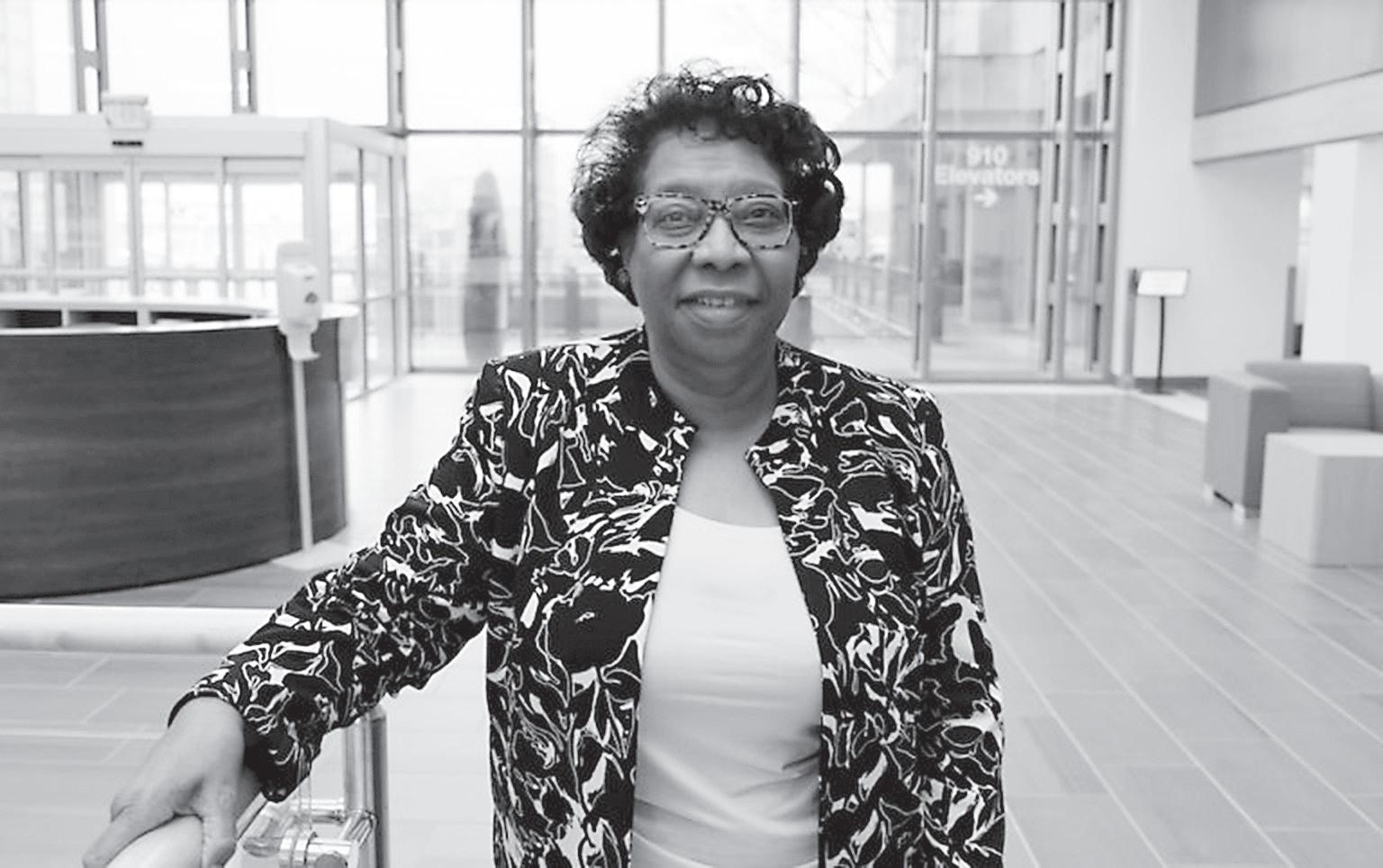
UTHSC’s Dr. Shelley White-Means has spent decades working diligently to identify and reduce health disparities in Memphis. (Photo by Peggy Reisser/UTHSC)
Research (CHEER).
The organization aimed to enhance outcomes and increase the health status of the population in the city’s poorest inner-city neighborhood by addressing food insecurity and food deserts, performing health risk assessments, investigating breast cancer disparities, conducting community health summits, and other programs.
“Our emphasis was community-based participatory research collaborations that engaged many agencies that today would be described as ‘social determinants of health’ organizations,” she said. “This focus is very popular now, but at that point, it wasn’t.”
In October, White-Means presented a paper at the Hooks Institute for Social Change at the University of Memphis on the impact of job types on individual health. It was titled, “Workplace Setting and Job Types as Determinants of Health Disparities.”
She produced that paper to make the public aware that the jobs they have chosen will impact health outcomes. Gig-market or contract jobs that don’t carry health care coverage tend to be filled by minorities.
“We need to look at what is going on in the labor force,” she said. “It’s not just about wages. Employees need to be aware that job choices and the growing racial divide in quality of jobs impact health over the lifetime.”
The Memphis-Shelby County Education Association hosted the Memphis Mardi Gras Ball Mystic at its headquarters at 126 Flicker St. last Saturday (Feb.

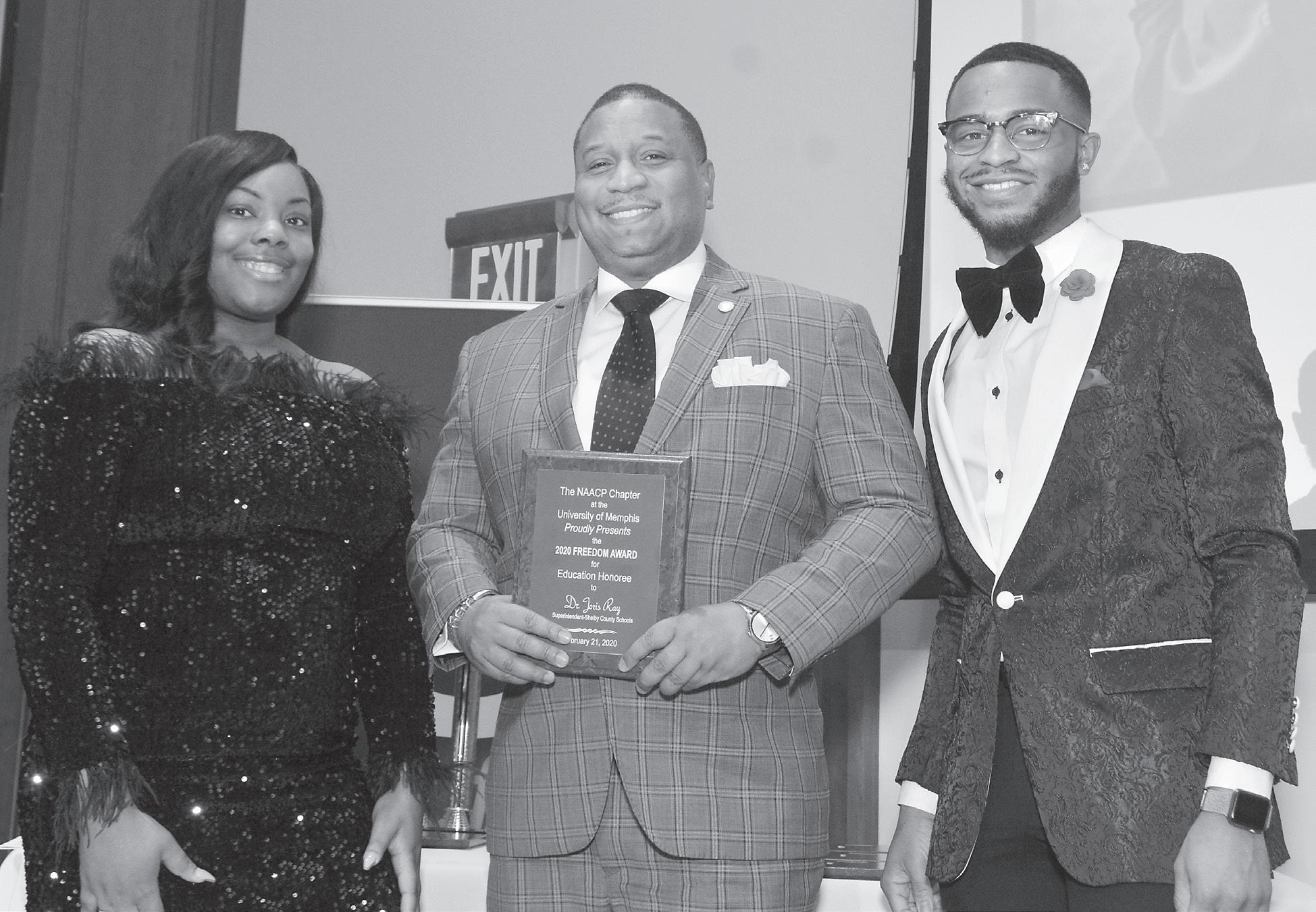
Dr. Joris Ray, Shelby County Schools superintendent, was the education honoree as the University of Memphis Chapter of the NAACP presented the annual Freedom Awards and Mahogany Ball at the University Center Ballroom at the University of Memphis last Friday ( Feb. 21). Also honored were Ekundayo Bandele (community service), the Rev. O.C. Collins Jr. (religion) and Teresa Dickerson
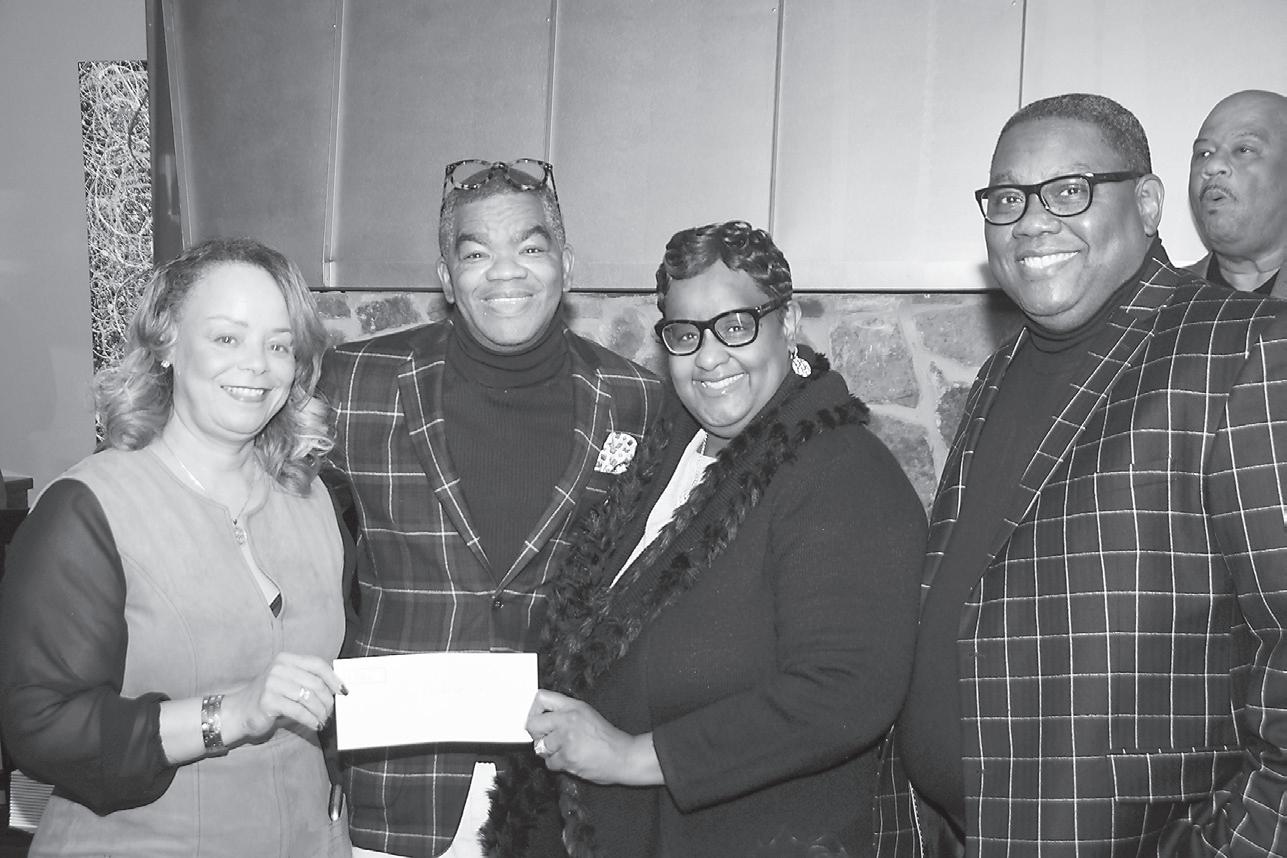
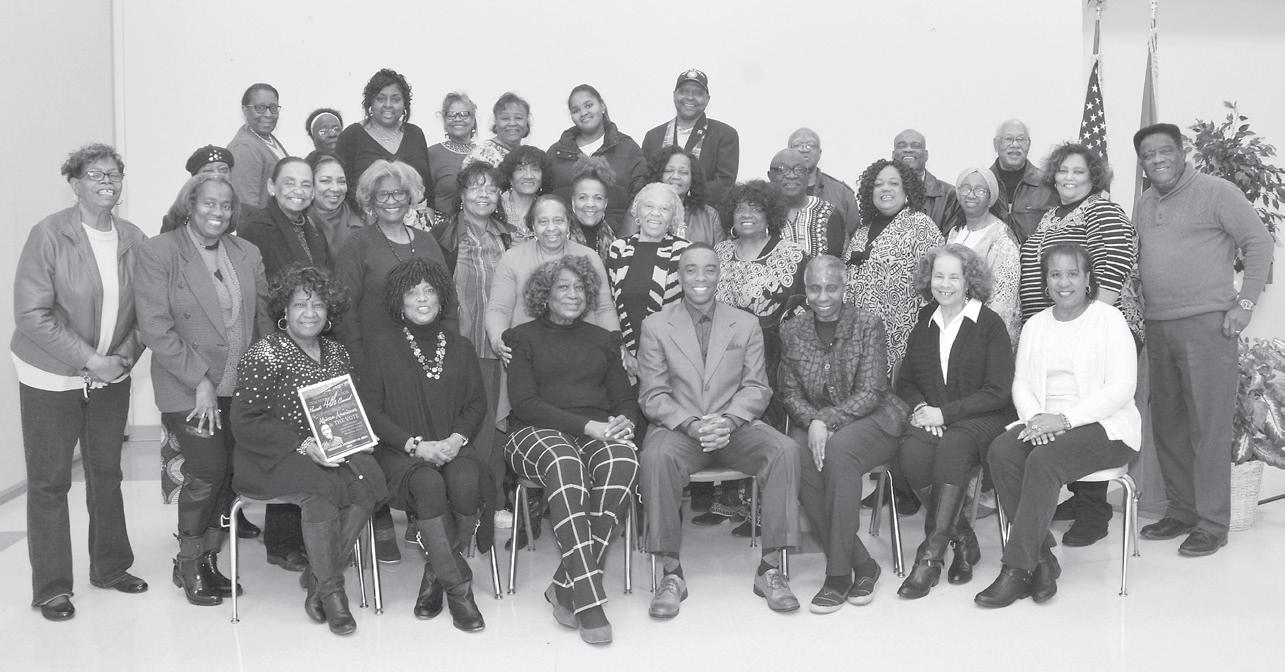
WASHINGTON – Sixty-five years after 14-year-old Emmett Till was lynched in Mississippi, the House has approved legislation designating lynching as a hate crime under federal law.
The bill, introduced by Illinois Rep. Bobby Rush and named after Till, comes 120 years after Congress first considered anti-lynching legislation and after dozens of similar efforts were defeated.
The measure was approved 410 to 4 on Wednesday. The Senate unanimously passed virtually identical legislation last year, although that bill wasn’t named for Till. President Donald Trump is expected to sign the bill, which designates lynching as a federal hate crime punishable by up to life in prison, a fine, or both.
Rush, a Democrat whose Chicago district includes Till’s former home, said the bill will belatedly achieve justice for Till and more than 4,000 other lynching victims, most of them African Americans.
Till, who was black, was brutally tortured and killed in 1955 after a white woman accused him of grabbing her and whistling at her in a Mississippi grocery store. The killing shocked the country and stoked the civil rights movement.
“The importance of this bill cannot
about the progress made since you delivered your first one in 2019?
Harris: I think we’ve had significant impact and that we’ve been able to drive a conversation -- not just within Shelby County government, but across the community-issues that matter to a broad swath of our community. We’ve been able to drive conversations surrounding a livable wage.
We’ve also been able to talk about Pre-k, while also being able to devote a lot of money to it. I don’t know how we found $8.5 million, but we found it to invest in Pre-k. Then we’ve also driven a communitywide debate around public transit.
TSD: We know the County Commission recently approved an annual one-million-dollar-plus investment in public transit. In addition, there’s a lot of conversation surrounding the potential of obtaining additional funds – specifically $9 million more. Some commissioners and residents have thanked you for driving the public transit conversation. Do you give yourself credit for that?
Harris: The point of running for office was to drive a conversation that mattered. It was not to get into office and sit around and talk about the same ‘ole things’. Instead we view this office as an advocacy organization to drive a debate around issues that matter to the public.
Right now we are at the 50-yard line with transit, with about 50 more yards to go. As you said, we were able to get the County Commission to approve the first part of the transit plan that is dedicated CIP funding. We know there is a need out there for shelters and buses that are zero or low emission. That money will be used for all of those purposes and we are very excited.
TSD: If you had to choose one thing you’ve been able to accomplish since taking office that you’re most proud of, what would it be?
Mayor Harris: It would definitely be education. Education is what I ran on. Vo-tech was number two and we were able to launch our Vo-Tech program last year, with the pilot school being MLK College Prep in Frayser.
TSD: Speaking of Frayser, you created quite a buzz during your State of the County when you mentioned the potential in investing $50 million in the building of a new high school in Frayser. Why is this something that you think needs to be done, and specifically in that community?
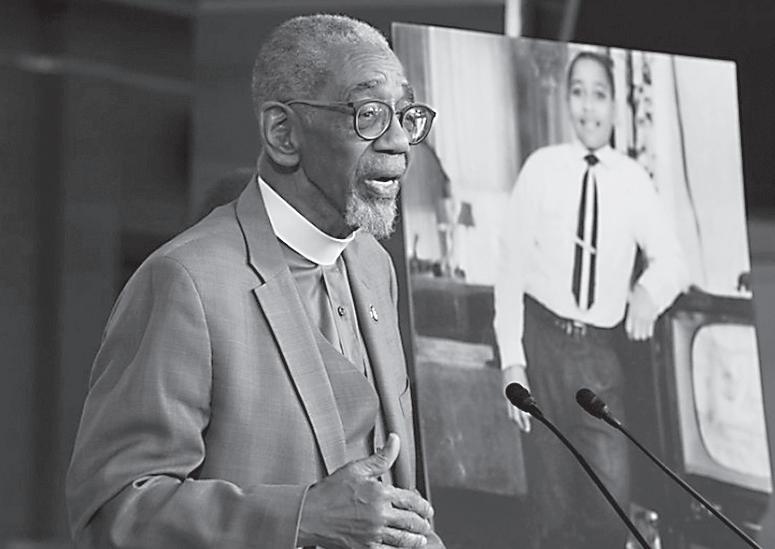
be overstated,” said Rush, a member of the Congressional Black Caucus. ”From Charlottesville to El Paso, we are still being confronted with the same violent racism and hatred that took the life of Emmett and so many others. The passage of this bill will send a strong and clear message to the nation that we will not tolerate this bigotry. ”
Rep. Bennie Thompson, D-Miss., who represents the area where Till was abducted and murdered, called the anti-lynching bill long overdue,
but said: “No matter the length of time, it is never too late to ensure justice is served.”
House Majority Leader Steny Hoyer, D-Md., used similar language to urge the bill’s passage. “It is never too late to do the right thing and address these gruesome, racially motivated acts of terror that have plagued our nation’s history,” he said, urging lawmakers to “renew our commitment to confronting racism and hate.”
The bill was unanimously support-
ed by Democrats. Three Republicans — Louie Gohmert of Texas, Thomas Massie of Kentucky and Ted Yoho of Florida — opposed the bill, along with independent Rep. Justin Amash of Michigan.
Gohmert said he supported the bill’s concept, but preferred that those accused of lynching in Texas be tried in state court, where they could face the death penalty.
Massie said he opposed the expansion of federal hate-crime laws. “A crime is a crime, and all victims deserve equal justice,” he said in a statement. ”Adding enhanced penalties for ‘hate’ tends to endanger other liberties such as freedom of speech.”
Democratic Rep. Karen Bass of California, who chairs the Congressional Black Caucus, called lynching a lasting legacy of slavery.
“Make no mistake, lynching is terrorism,” she said. ”While this reign of terror has faded, the most recent lynching (in the United States) happened less than 25 years ago.”
Although Congress cannot truly rectify the terror and horror of these acts, Bass said, a legislative body that once included slave owners and Ku Klux Klan members will belatedly “stand up and do our part so that justice is delivered in the future.”
Democratic Sens. Kamala Harris of California and Cory Booker of New Jersey applauded House passage of the bill, which mirrors legis-
lation they co-sponsored in the Senate along with Sen. Tim Scott, R-S.C. The three are the Senate’s only black members.
“Lynchings were horrendous, racist acts of violence,” Harris said in a statement. “For far too long Congress has failed to take a moral stand and pass a bill to finally make lynching a federal crime. This justice is long overdue.”
Booker called lynching “a pernicious tool of racialized violence, terror and oppression” and “a stain on the soul of our nation.” While Congress cannot undo lynching’s irrevocable damage, ”we can ensure that we as a country make clear that lynching will not be tolerated,” Booker said.
Congress has failed to pass anti-lynching legislation nearly 200 times, starting with a bill introduced in 1900 by North Carolina Rep. George Henry White, the only black member of Congress at the time.
Kristen Clarke, president of the Lawyers’ Committee for Civil Rights Under Law, said passage of the anti-lynching legislation “marks a milestone in the long and protracted battle against white supremacy and racial violence in our country.”
The bill “makes clear that lynchings occupy a dark place in our country’s story and provides recognition of thousands of victims of lynching crimes,” including Emmett Till and many others, Clarke said.
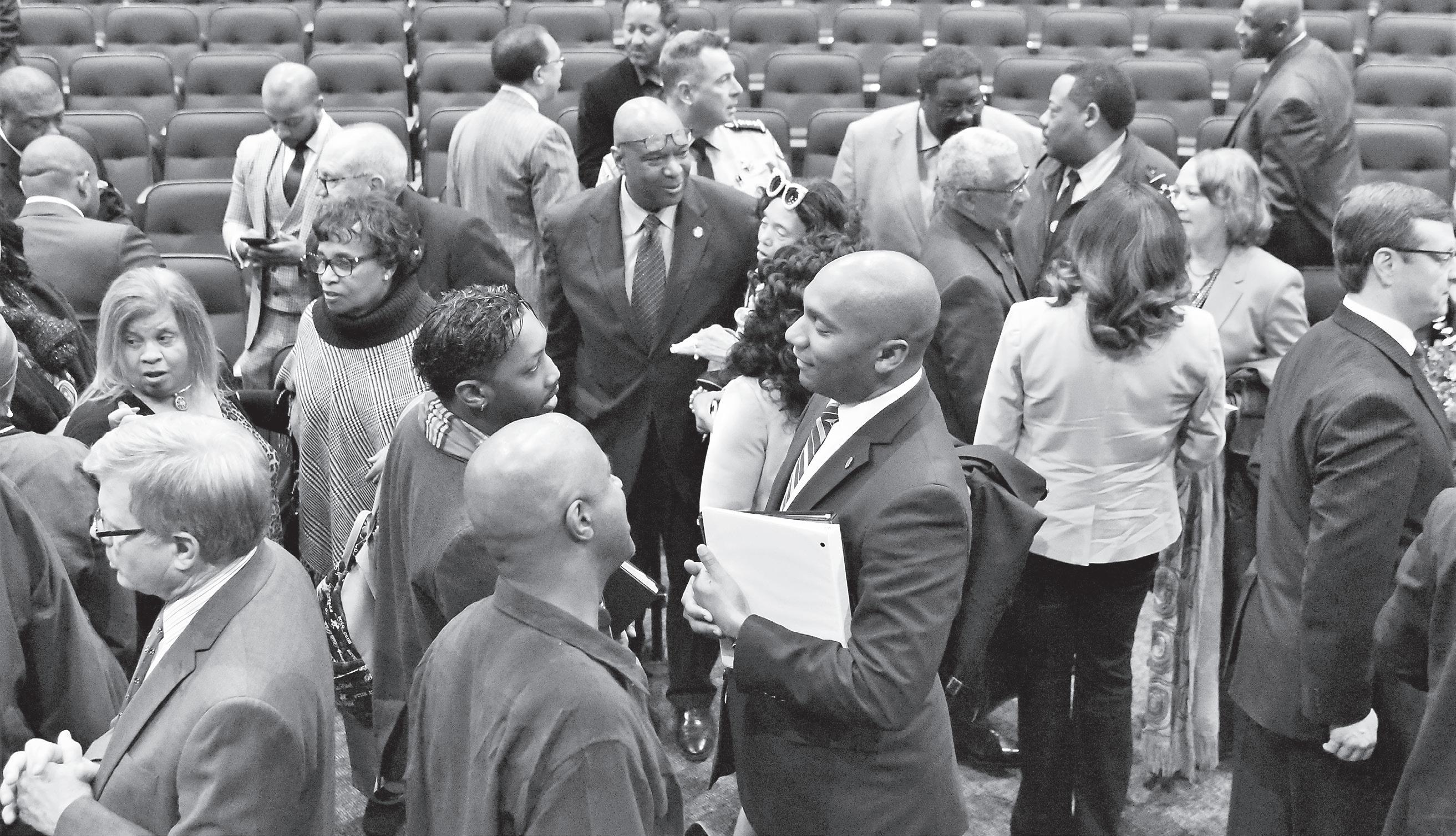
Harris: Shelby County Schools was established in 2013, but has never built a high school. It is time for us to invest in our facilities. We know that the buildings in the Frayser community are decades old. In fact, the vast majority of schools in Shelby County School System are 40 years or older.
So it’s an opportunity to build a high school for the first time for Shelby County Schools, to bring topnotch first rate learning environment to the kids in Frayser and an opportunity to show that Shelby County government and Shelby County School system can work together for a common cause.
If we can get that done we can move on to a larger and more ambitious plan to get rid of the deferred maintenance and build even more schools around our county.
TSD: Where will the $50 million investment come from?
Harris: Funding will come from the county. The money is there. If the Shelby County School Board agrees to take the money then we have the possibility of a new high school in Frayser. If the Shelby County School Board does not and puts up some issue or challenge then we won’t; but that is where it stands.
TSD: Let’s shift gears to public safety. You’ve mentioned it as another top priority of yours -- both as an accomplishment and something you
hope to see more progress in. Why is that?
Harris: I am excited to say that we are poised to make the largest investment in public safety in this community. That is if we can get the County Commission to approve an increase in the car registration fees. Part of that money will be used to hire deputy sheriffs.
If we hire deputy sheriffs as planned, it will be the largest increase in our deputy sheriff complement in recent memory. They will be hired to patrol the areas of the county that were de-annexed. And I would love to get all of this done without a tax increase, but we will see.
TSD: Let’s talk about the possibility of increasing car registration fees. It’s part of your “Future for Transit Plan,” where the goal is for Shelby County to invest $10 million per year in public transit.
Harris: Right, but we do not want to think of it as just an increase. It is an investment in public transit. There has not been an increase on car registration fees in 20 years. So what we are saying to the commission is that if you increase the registration fee by $20 we can make a massive investment in transit plus enough to hire 40 additional deputy sheriffs.
TSD: We have to discuss the issue of poverty in Shelby County -- for two reasons because the numbers are increasing and also because you ran
on the goal of lifting at least 50,000 people out of poverty. What is the plan to tackle the rising poverty issue?
Harris: One of the ways you lift people out of poverty is that you pay them a livable wage. The reason why people are in poverty in many cases is not because they are not working, it is because they are not making a livable wage. So we need to make sure people are making at least $15 an hour.
I was just at an event at Christian Brothers University, where they commended me for driving a conversation around $15 an hour, and they recently made their announcement that they are planning to pay their employees that. That is how you lift people out of poverty -- you pay them a job with a livable wage.
Another thing is tackling generational poverty, and the best way to do that is to provide more meaningful educational opportunities. That is why you build a top-notch school in Frayser. Communities that have been too hard hit and have not received enough attention.
That is why we have also focused on a massive investment in Pre-k. Because you want to make sure that generational poverty ends and that the next generation has more opportunities.
All of that is important and that is why we are just going to continue doing those things until we turn this thing around.
TSD: What would you say is the biggest problem Shelby County faces right now?
Harris: Absolutely poverty is the biggest problem. Our poverty levels are way too high and it is time for us to laser light focus on it.
TSD: You’ve mentioned a few plans you hope to implement during your term. What’s your primary focus right now?
Harris: To continue focusing on education. I am tired of seeing crumbling school buildings and kids without enough opportunity. My goal is making sure that kids have more opportunity. My other primary focus is public safety and making sure that we do something to strengthen our re-entry programming because part of the problem is that our recidivism rate is too high.
TSD: You’ve had a pretty full political career -- city councilman, state senator and, now, Shelby County mayor. What kind of imprint would you like make during your term?
Harris: My dad used to have a saying, asking what have you done today. So I am only focused on today -- how far have I moved the ball today, at this very moment. What will I be working on tomorrow? I do not look back and say, well what did we accomplish, I do not have time for that, it is too much to be done. I am only focused on today.
Rep. Bobby Rush, D-Ill., speaks during a news conference about the “Emmett Till Antilynching Act” which would designate lynching as a hate crime under federal law, on Capitol Hill in Washington, Wednesday, Feb. 26, 2020. Emmett Till, pictured at right, was a 14-year-old African-American who was lynched in Mississippi in 1955, after being accused of offending a white woman in her family’s grocery store. (AP Photo/J. Scott Applewhite)





















































































□
□ Joseph R. Biden
□ Michael R. Bloomberg
□ Cory Booker
□ Pete Buttigieg
Castro
□
□ John K. Delaney
□ Tulsi Gabbard
□ Amy Klobuchar
□ Deval Patrick
□ Bernie Sanders
□ Tom Steyer
□ Elizabeth Warren
□ Marianne Williamson
□ Andrew Yang
□ Write- In GENERAL
□
□ Rheunte E. Benson
□ Joe Brown
□ Tanya L. Cooper
□ Adrienne Dailey-Evans
□ Deirdre V. Fisher
□ R. S. Ford Sr
□ Del Gill
□ Eddie Jones
□ Thomas Long
□ Wanda Logan-Faulkner
□ Reginald Milton
□ Tavia Tate
□

□ Paul C. Boyd
□ Michael Finney
□ George “Dempsy” Summers
□ Lisa W. Wimberly
□ Write-In
□
□
□
□
□
(Trump)
Roland (Trump)
The purpose of this election is for each political party to select their candidates for the general election; so you must select the either ballot of the Democratic Party or the Republican Party. The Republican party elects their delegates to the National Convention; delegates for the Democratic party are selected in accordance with their rules and they do not appear on the ballot



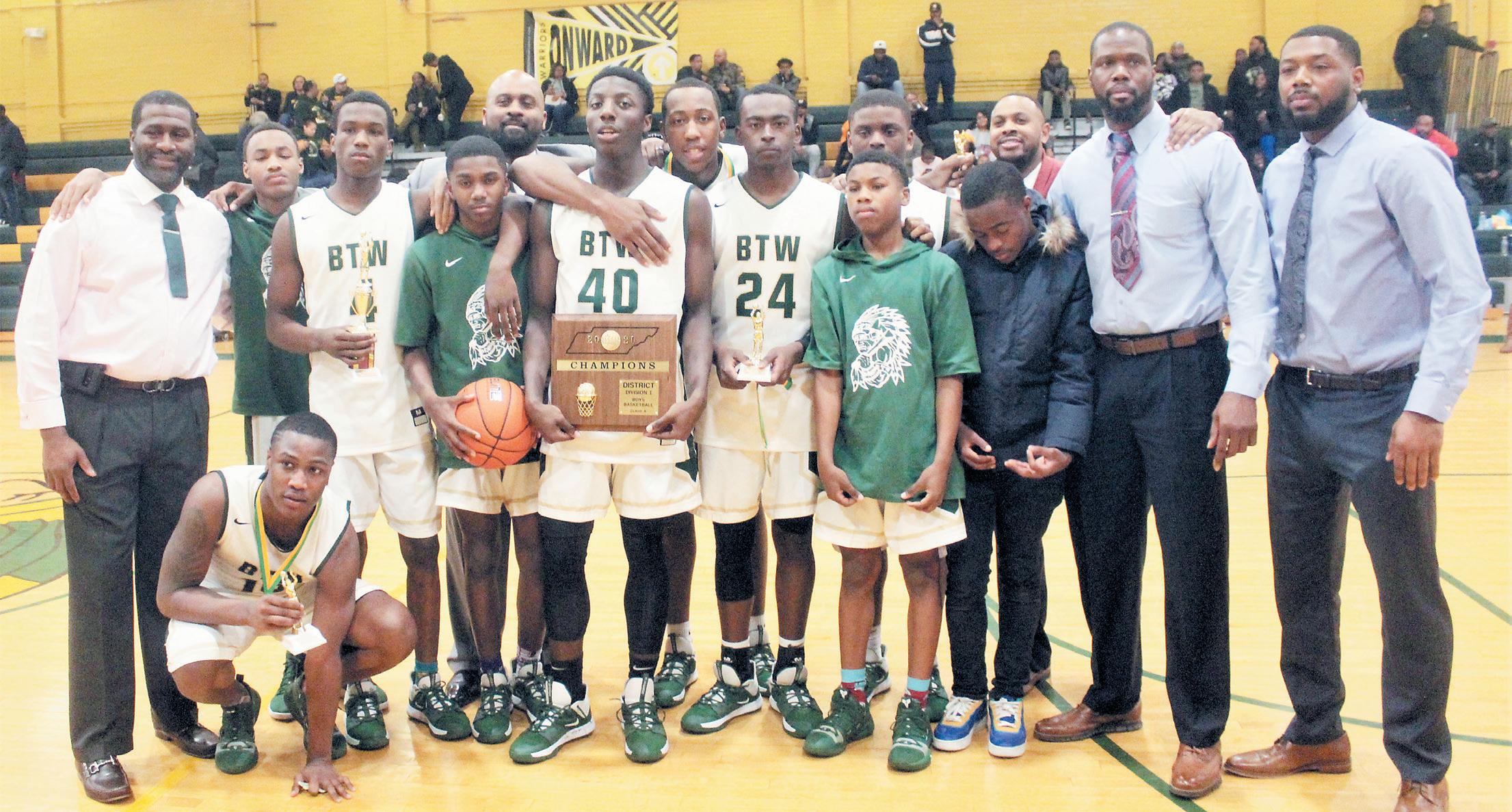
Booker T. Washington Warriors’ head coach Antonio Harris knows the value of home court in playoff basketball.
That is one of the reasons he and his athletic director wanted to host the 15-A District tournament. That home court advantage came in handy for the championship game against the Memphis Academy of Health and Science Academy (MAHS).
The Warriors were able to hold back the charge of the Lions to win the District Championship (65-61). The Lions were down by as many as 10 points in the game, but the battled back to almost pull out the upset in the end.
This was the second meeting of the season for this team. Washington won the first meeting 78-66 at the Lions home court. The Warriors were led by the guards Charterrio Porter (32 points), JC Johnson (12 points) and Mikhall Garrett (6 points).
Porter connected on 9 of 10 free throws and he made four three pointers. The contest was a battle of the inside game of the Lions versus the outside game of the Warriors.
Junior center David Dixon was a force on the inside. He led the Lions with 25 points. Most of Dixon’s damage occurred around the rim and free throws. Dixon had nine made baskets and went seven of nine from the free throw line.
Senior guard Ronald Berkley added 15 points and connected on three three-pointers.
“We pulled out a close one. I’m glad
our kids came out on the winning end,” said Harris.
Regarding the play of the guards, Harris said, “They are the glue of the team. They are the wheels to our cars. As long as they can keep on performing we are going to go as far as they take us.” The head coach of the Lions Vernard Watkins said, “I think it was a great game to come in there with a great atmosphere. They have veteran team. For us to come in have a good showing is big for us. This just sets the tone for us moving forward.”
Regarding Dixon’s play, Watkins said, “He is a great player. He has a high motor and he plays both ends of the court. Most of the time he is double and triple teamed. He played an awesome game.”
The BTW women had their hands full with the Lady Executives from the Memphis Business Academy. The Warriors were able to stage a come back to defeat the current SCIAA Champions.
The Lady Warriors missed their first six free throws in the first period and fell behind (13-8).
The game was ugly in the first half; with each team being called for a lot of fouls and committing unforced turnovers. In the second half the offenses took off. The Warriors were able to pull back into a tie midway in the third period.
BTW was able to take a 31-30 lead into the final period. The Warriors went on an 18-8 run in the final period to secure the win.
MBA head coach Reshun Spears was in a worst situation last season when his team finished third in the district tournament, but they were able to win the regional last year “It was a good game. Both teams played hard. They made shots and we didn’t,” said Spears. “I just want our team to play well. We had too many turnovers tonight. We didn’t finish when had to.”
“Some of the fouls did hurt and people may have disagreed, but you can’t blame the refs,” said Spears. “That is the game of life. You have to make sure you don’t put yourself in a situation or things not to go your way.”
This is the third straight District Championship for head coach Steven McKinney and the Lady Warriors. “I love coach Spears and they worked so hard. We have been battling for years,” said McKinney. “I thought my girls persevered. We were down at the half. We were down because we were missing our free throws.”
He added, “We were so ramped up to start the game. That is why we were missing free throws early. I told them to slow down and breathe and starting playing our game.”
The Warriors have five seniors. They all have been playing together since middle school. That experience has allowed them to stay focus when adversity hits.
The Warriors were led by Tramesha Rodgers (12 points), and Anteresa Dickson and Erica McNeil each had (10 points).
Ainyah Rucker was the only Lady Executive who scored in double digits (10 points).

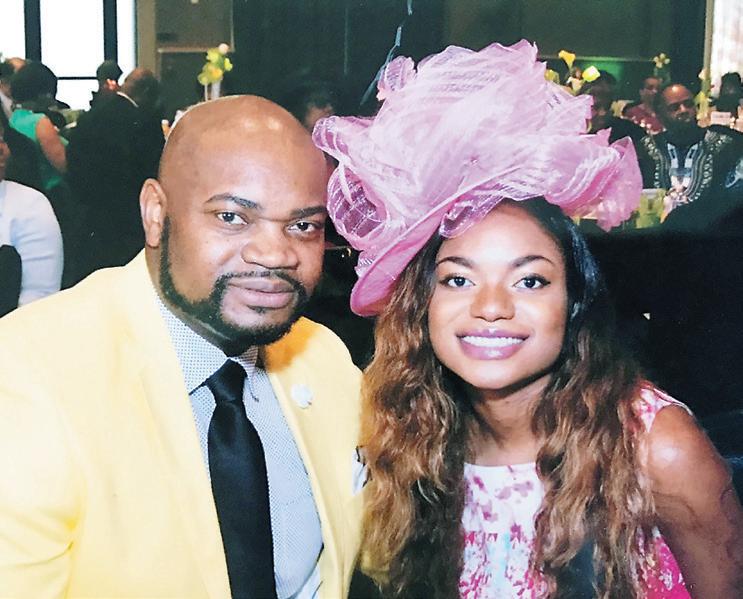
It has been nearly a month since the untimely death of NBA Legend Kobe Bryant. Though much will be made of his legacy as one of the NBA’s transcendent superstars, it is the haunting knowledge of what was still to come for the father and daughter duo that triggers a unique sense of sorrow.
Over the passing weeks, I found comfort reading posts of fathers honoring their relationships with their daughters, using hashtag #GirlDad, in memory of the ultimate “girl dad.”
The trend started with ESPN anchor Elle Duncan sharing a memory of Bryant.
“When I reflect on this tragedy,” Duncan said, “I suppose that the only small source of comfort for me is knowing that he died doing what he loved the most: Being a dad. Being a girl dad.”
Bryant was a father to four daughters — Natalia, Bianka, Capri and Gianna. Gianna perished with him, along with seven others, in a helicopter crash in Calabasas, California on Sunday, Jan. 26.
As Duncan’s story went viral, thousands of fathers responded to the story on social media using the hashtag #GirlDad to share photographs and express fatherly pride.
The hashtag #GirlDad are among the touching tributes fans shared about Bryant, who encouraged dads to lift up their daughters athletic abilities.
Kobe was an advocate of that, having said confidently that Gigi was talented enough to carry on his legacy on the court.
In many ways, Kobe and Gianna deaths triggered an emotion in me that caused me to reminisce about the bond my father and I shared.
I learned to play basketball and had a passion for the game because of my dad. Frankly, many of my interests, including writing, are because of his willingness to introduce me to the things he loved.
I know even in my dad’s absence he is a proud #GirlDad.
The hashtag resonated with me because I know how important dads are to this world. The hardest adjustment I’ve ever had to make in life was adapting to life without my father.
Much like Bryant, my dad had confidence in his daughter’s ability to create her own legacy — but to also further his.
In an interview with late-night TV host Jimmy Kimmel, Bryant talked about a fan approaching him and Gianna. The fan said Bryant needed to have a son in order to continue Bryant’s legacy. Gianna responded by saying that Bryant did not need a boy for that. “I got this,” Gianna said. Bryant responded by saying, “Yes you do. You got this.”
The development of the hashtag #GirlDad demonstrates examples of how fathers should value their daughters, and in turn, women. It encourages fathers to place no limits on what their daughters are capable of.
Being a #GirlDad means raising a daughter who can follow in your footsteps and encouraging her just as much as you would a son.
As we approach my dad’s birthda, Feb. 28, I want to thank him for always being the best #GirlDad.
Happy Heavenly Birthday! I love you forever.
Booker T. Washington’s Warriors outlasted the Lions of the Memphis Academy of Health and Science Academy to capture the 15-A District title. (Photos: Terry Davis)